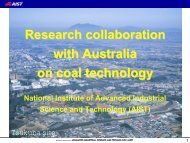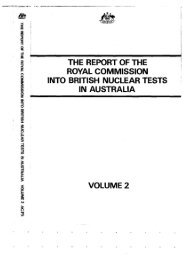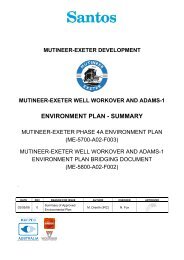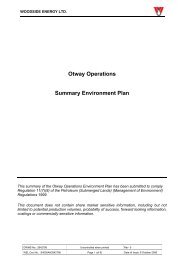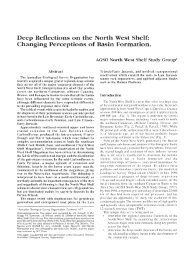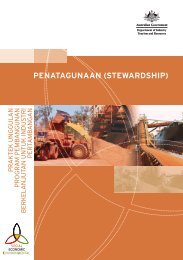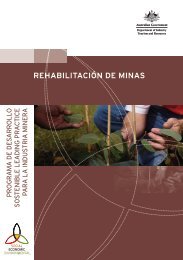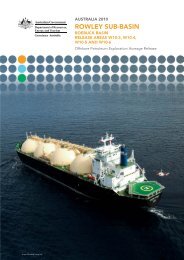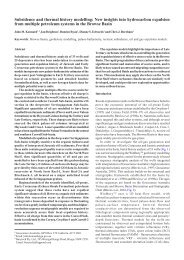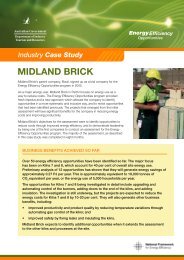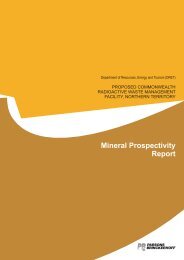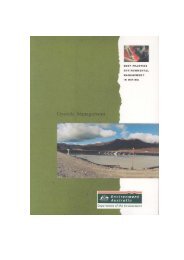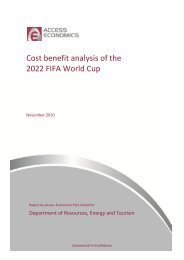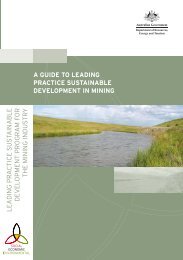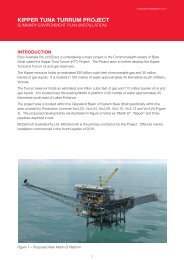working in partnership - Department of Resources, Energy and ...
working in partnership - Department of Resources, Energy and ...
working in partnership - Department of Resources, Energy and ...
Create successful ePaper yourself
Turn your PDF publications into a flip-book with our unique Google optimized e-Paper software.
WORKSHOP REPORT<br />
WORKING IN PARTNERSHIP<br />
M<strong>in</strong><strong>in</strong>g <strong>and</strong> Indigenous Communities<br />
Rockhampton,<br />
Queensl<strong>and</strong><br />
16 -<br />
th th<br />
-17 April, 2004.<br />
Prepared<br />
for<br />
<strong>Department</strong> <strong>of</strong> Industry, Tourism <strong>and</strong> <strong>Resources</strong><br />
20 Allara Street<br />
Canberra City ACT 2601<br />
14 th May 2004<br />
Grant Sarra Consultancy Services<br />
ABN 19 492 613 302
Work<strong>in</strong>g <strong>in</strong> Partnership - Rockhampton Workshop<br />
M<strong>in</strong><strong>in</strong>g <strong>and</strong> Indigenous Communities<br />
Prepared by Grant Sarra<br />
Grant Sarra Consultancy Services<br />
Lot 95 Patricia Street<br />
KARALEE Qld 4306<br />
Telephone: 07 3294 6096<br />
Mobile: 0417 502 049<br />
Email: sarra@gil.com.au<br />
Dr Sally Sheldon<br />
School <strong>of</strong> Law<br />
Queensl<strong>and</strong> University <strong>of</strong> Technology<br />
Gardens Po<strong>in</strong>t Campus<br />
GPO Box 2434<br />
BRISBANE Qld 4001<br />
Telephone: 07 3864 5210<br />
Mobile: 0408 743 868<br />
Email: s.sheldon@qut.edu.au<br />
Grant Sarra Consultancy Services - ABN 19 492 613 302 2
Work<strong>in</strong>g <strong>in</strong> Partnership - Rockhampton Workshop<br />
M<strong>in</strong><strong>in</strong>g <strong>and</strong> Indigenous Communities<br />
CONTENTS<br />
1. INTRODUCTION .........................................................................................................4<br />
1.1 Background...........................................................................................................4<br />
1.2 Rockhampton Work<strong>in</strong>g <strong>in</strong> Partnership Workshop .....................................................5<br />
1.3 Purpose <strong>of</strong> this Report ...........................................................................................5<br />
2. WORKSHOP OVERVIEW ...........................................................................................6<br />
2.1 Workshop Theme, Aims <strong>and</strong> Expected Outcomes ...................................................6<br />
2.2 Methodology .........................................................................................................7<br />
2.3 Workshop Plann<strong>in</strong>g ...............................................................................................7<br />
2.3.1 Prelim<strong>in</strong>ary Consultation with Key Stakeholders ......................................................8<br />
2.3.2 Workshop Participation ..........................................................................................8<br />
2.3.3 Venue................................................................................................................. 10<br />
2.3.4 Social Function....................................................................................................10<br />
2.3.5 Participant Feedback ...........................................................................................10<br />
3. WORKSHOP OUTCOMES ........................................................................................11<br />
3.1 Introductions <strong>and</strong> Scene Sett<strong>in</strong>g ...........................................................................11<br />
3.2 Problem Analysis <strong>and</strong> Issue Search......................................................................12<br />
3.2.1 Resourc<strong>in</strong>g..........................................................................................................12<br />
3.2.2 Lack <strong>of</strong> Empathy..................................................................................................13<br />
3.2.3 Timel<strong>in</strong>es ............................................................................................................13<br />
3.2.4 Decision-mak<strong>in</strong>g Capacity....................................................................................14<br />
3.3 Core Wants <strong>and</strong> Needs ........................................................................................14<br />
3.3.1 Exploration Stage ................................................................................................ 15<br />
3.3.2 Project Feasibility Stage.......................................................................................15<br />
3.3.3 Project Development Stage ..................................................................................16<br />
3.3.4 Project Commission<strong>in</strong>g Stage...............................................................................16<br />
3.4 Selected Case Studies – Keys to Successful Partnerships .....................................16<br />
3.5 SWOT Analysis – Strengths, Weaknesses, Opportunities <strong>and</strong> Threats....................18<br />
3.6 Recommendations for Future Action – Formation <strong>of</strong> a Regional Partnership Advisory<br />
Committee ..........................................................................................................18<br />
3.6.1 Individual Group Recommendations .....................................................................18<br />
3.6.2 Workshop Resolution – Formation <strong>of</strong> a Regional Partnership Advisory Committee...19<br />
4. REGIONAL CHALLENGES TO PARTNERSHIP BUILDING ....................................... 20<br />
4.1 Develop<strong>in</strong>g Mutual Awareness, Knowledge <strong>and</strong> Underst<strong>and</strong><strong>in</strong>g ..............................20<br />
4.2 Establish<strong>in</strong>g <strong>and</strong> Ma<strong>in</strong>ta<strong>in</strong><strong>in</strong>g Relationships ...........................................................21<br />
4.3 Establish<strong>in</strong>g a Functional Regional Partnership Advisory Committee ......................21<br />
4.4 Address<strong>in</strong>g Resource Disparity.............................................................................21<br />
4.5 Def<strong>in</strong><strong>in</strong>g <strong>and</strong> Articulat<strong>in</strong>g Key Stages <strong>in</strong> the Process ..............................................22<br />
4.6 Meet<strong>in</strong>g Time/Project Deadl<strong>in</strong>es ...........................................................................22<br />
4.7 Traditional Owner Strategic Goals <strong>and</strong> Priorities ....................................................23<br />
5. CONCLUSION – MAKING PARTNERSHIPS REAL.................................................... 25<br />
Appendix A Workshop Participants.............................................................................26<br />
Appendix B Problem Analysis <strong>and</strong> Issue Search.........................................................29<br />
Appendix C Core Wants <strong>and</strong> Needs Analysis..............................................................31<br />
Appendix D Regional SWOT Analysis – Whole Group .................................................34<br />
Grant Sarra Consultancy Services - ABN 19 492 613 302 3
Work<strong>in</strong>g <strong>in</strong> Partnership - Rockhampton Workshop<br />
M<strong>in</strong><strong>in</strong>g <strong>and</strong> Indigenous Communities<br />
1. INTRODUCTION<br />
1.1 Background<br />
The Work<strong>in</strong>g <strong>in</strong> Partnership – the M<strong>in</strong><strong>in</strong>g Industry <strong>and</strong> Indigenous Communities<br />
Program was launched by the Commonwealth Government on 3 rd August 2001. The<br />
program is adm<strong>in</strong>istered by the <strong>Department</strong> <strong>of</strong> Industry, Tourism <strong>and</strong> <strong>Resources</strong> <strong>and</strong><br />
seeks to promote long term <strong>partnership</strong>s between Indigenous communities <strong>and</strong> the<br />
exploration <strong>and</strong> m<strong>in</strong><strong>in</strong>g <strong>in</strong>dustry.<br />
In addition to promot<strong>in</strong>g long term <strong>partnership</strong>s, the program aims to support <strong>and</strong><br />
encourage the ongo<strong>in</strong>g cultural change that has occurred between the exploration <strong>and</strong><br />
m<strong>in</strong><strong>in</strong>g <strong>in</strong>dustry <strong>and</strong> Indigenous communities <strong>in</strong> recent years. In so do<strong>in</strong>g, it seeks to<br />
build on relevant research which has recently been conducted <strong>in</strong> relation to susta<strong>in</strong>able<br />
m<strong>in</strong><strong>in</strong>g practices. 1<br />
S<strong>in</strong>ce the program’s <strong>in</strong>ception, the <strong>Department</strong> has developed an <strong>in</strong>formation kit which:<br />
� presents selected case studies <strong>of</strong> successful <strong>partnership</strong> relationships between<br />
m<strong>in</strong><strong>in</strong>g companies <strong>and</strong> Indigenous communities, show<strong>in</strong>g a variety <strong>of</strong> approaches<br />
<strong>and</strong> outcomes;<br />
� reflects the diverse experiences <strong>of</strong> some <strong>of</strong> the people <strong>in</strong>volved <strong>in</strong> the <strong>partnership</strong><br />
process;<br />
� illustrates the achievements <strong>of</strong> particular companies <strong>and</strong> Indigenous<br />
communities; <strong>and</strong><br />
� provides <strong>in</strong>formation on the relevant government <strong>and</strong> <strong>in</strong>dustry programs that<br />
provide <strong>partnership</strong> <strong>in</strong>itiatives.<br />
The <strong>in</strong>formation kit can be accessed by contact<strong>in</strong>g the <strong>Department</strong> directly or through<br />
the program website:<br />
http://www.<strong>in</strong>dustry.gov.au/<strong>in</strong>digenous<strong>partnership</strong>s.<br />
The program has also<br />
<strong>in</strong>volved the conduct <strong>of</strong> a series <strong>of</strong> regionally based workshops<br />
<strong>in</strong> key areas <strong>of</strong> <strong>in</strong>terest throughout Australia. To date, three workshops have been<br />
conducted, with the first be<strong>in</strong>g held <strong>in</strong> Alice Spr<strong>in</strong>gs <strong>in</strong> June 2002, <strong>and</strong> the second <strong>and</strong><br />
third <strong>in</strong> Kalgoorlie <strong>and</strong> Port Hedl<strong>and</strong> <strong>in</strong> March <strong>and</strong> May 2003, respectively.<br />
The workshops have served to br<strong>in</strong>g together stakeholders <strong>in</strong> major regional centres <strong>of</strong><br />
m<strong>in</strong><strong>in</strong>g activity, <strong>and</strong> to facilitate the discussion <strong>of</strong> local issues <strong>and</strong> progress towards<br />
achiev<strong>in</strong>g local outcomes.<br />
1 See, e.g., Indigenous Support Services <strong>and</strong> ACIL Consult<strong>in</strong>g, Agreements between M<strong>in</strong><strong>in</strong>g Companies<br />
<strong>and</strong> Indigenous Communities: A Report to the Australian M<strong>in</strong>erals <strong>and</strong> <strong>Energy</strong> Environment Foundation,<br />
2001 (available onl<strong>in</strong>e at http://www.natural-resources.org/m<strong>in</strong>erals/CD/docs/mmsd/australia/f<strong>in</strong>alreport/<br />
<strong>in</strong>digenous.pdf); The Allen Consult<strong>in</strong>g Group, Indigenous Communities & Australian Bus<strong>in</strong>ess: From Little<br />
Th<strong>in</strong>gs, Big Th<strong>in</strong>gs Grow, 2001 (available onl<strong>in</strong>e at http://www.bca.com.au/content.asp?newsid=87347); D<br />
Brereton, “The Role <strong>of</strong> Self-Regulation <strong>in</strong> Improv<strong>in</strong>g Corporate Social Performance: The Case <strong>of</strong> the<br />
M<strong>in</strong><strong>in</strong>g Industry”, Centre for Social Responsibility <strong>in</strong> M<strong>in</strong><strong>in</strong>g, University <strong>of</strong> Queensl<strong>and</strong>, 2002 (available<br />
onl<strong>in</strong>e at http://www.csrm.uq.edu.au/docs/brereton_2002_1.pdf); L Tedesco et al, Indigenous People <strong>in</strong><br />
M<strong>in</strong><strong>in</strong>g, Australian Bureau <strong>of</strong> Agricultural <strong>and</strong> Resource Economics, 2003.<br />
Grant Sarra Consultancy Services - ABN 19 492 613 302 4
Work<strong>in</strong>g <strong>in</strong> Partnership - Rockhampton Workshop<br />
M<strong>in</strong><strong>in</strong>g <strong>and</strong> Indigenous Communities<br />
1.2 Rockhampton Work<strong>in</strong>g <strong>in</strong> Partnership Workshop<br />
In January 2004, the <strong>Department</strong> commissioned Grant Sarra Consultancy Services to<br />
conduct two workshops <strong>in</strong> Queensl<strong>and</strong> as a cont<strong>in</strong>uation <strong>of</strong> the program.<br />
Grant Sarra Consultancy Services conducted the first Queensl<strong>and</strong> workshop <strong>in</strong><br />
Rockhampton on the 16 th <strong>and</strong> 17 th April 2004. Rockhampton was chosen as the<br />
location for the first Queensl<strong>and</strong> workshop primarily because <strong>of</strong> its central location<br />
relative to Queensl<strong>and</strong>’s Bowen Bas<strong>in</strong> coal deposits <strong>and</strong> associated m<strong>in</strong><strong>in</strong>g <strong>and</strong><br />
exploration activity. A second workshop has been scheduled for the North West<br />
Queensl<strong>and</strong> area <strong>in</strong> June 2004.<br />
The Grant Sarra Consultancy Service workshop plann<strong>in</strong>g <strong>and</strong> facilitation team<br />
consisted <strong>of</strong>:<br />
� Grant Sarra, Project Director <strong>and</strong> Lead Facilitator - Grant Sarra Consultancy<br />
Services;<br />
� Dr Sally Sheldon, Project Manager <strong>and</strong> Facilitator - School <strong>of</strong> Law, Queensl<strong>and</strong><br />
University <strong>of</strong> Technology; <strong>and</strong><br />
� Michael May, Workshop Adm<strong>in</strong>istrator - School <strong>of</strong> Law, Queensl<strong>and</strong> University <strong>of</strong><br />
Technology.<br />
1.3 Purpose <strong>of</strong> this Report<br />
The purpose <strong>of</strong> this report is to provide:<br />
� an overview <strong>of</strong> the Rockhampton workshop, <strong>in</strong>clud<strong>in</strong>g its methodology, theme,<br />
aims <strong>and</strong> expected outcomes, structure <strong>and</strong> activities;<br />
� details <strong>of</strong> workshop outcomes; <strong>and</strong><br />
� suggestions that may enhance future <strong>partnership</strong>s <strong>in</strong> the region.<br />
The report recognises the diverse situations <strong>and</strong> circumstances that confront<br />
exploration <strong>and</strong> m<strong>in</strong><strong>in</strong>g companies <strong>and</strong> Indigenous Traditional Owner groups<br />
throughout Australia.<br />
For this reason, the suggestions provided <strong>in</strong> this report to enhance future <strong>partnership</strong>s<br />
<strong>in</strong> the Rockhampton region are not to be taken as necessarily applicable to other<br />
regions throughout Australia.<br />
Grant Sarra Consultancy Services - ABN 19 492 613 302 5
Work<strong>in</strong>g <strong>in</strong> Partnership - Rockhampton Workshop<br />
M<strong>in</strong><strong>in</strong>g <strong>and</strong> Indigenous Communities<br />
2. WORKSHOP OVERVIEW<br />
2.1 Workshop Theme, Aims <strong>and</strong> Expected Outcomes<br />
Theme<br />
The central theme <strong>of</strong> the workshop was the desirability <strong>of</strong> exploration <strong>and</strong> m<strong>in</strong><strong>in</strong>g<br />
companies, government/community service providers <strong>and</strong> Indigenous communities to<br />
explore <strong>partnership</strong> build<strong>in</strong>g:<br />
• recognis<strong>in</strong>g that they have much to learn from each other; <strong>and</strong><br />
• acknowledg<strong>in</strong>g the potential for mutual benefit that exists <strong>in</strong> establish<strong>in</strong>g sound<br />
<strong>work<strong>in</strong>g</strong> relationships with each other.<br />
Aims <strong>and</strong> expected outcomes<br />
The Rockhampton workshop had as its central aim the provision <strong>of</strong> a neutral regional<br />
forum, <strong>in</strong> which key stakeholders from the m<strong>in</strong><strong>in</strong>g <strong>and</strong> exploration <strong>in</strong>dustry, Indigenous<br />
communities <strong>and</strong> service agencies could meet to discuss regional issues <strong>and</strong> work<br />
towards regional solutions relevant to the support <strong>of</strong> local <strong>partnership</strong>s.<br />
Like earlier workshops <strong>in</strong> the program series, the workshop was not designed as an<br />
<strong>in</strong>formation-dissem<strong>in</strong>ation exercise, <strong>and</strong> was not, therefore, structured around formal<br />
presentations from guest speakers or <strong>in</strong>vitees. Nor was the workshop aim<strong>in</strong>g to<br />
develop “solutions” to regional problems which would be implemented <strong>and</strong> funded by<br />
the Commonwealth Government. Rather, <strong>in</strong> keep<strong>in</strong>g with the fact that the workshop<br />
facilitators <strong>and</strong> the departmental <strong>of</strong>ficers responsible for the workshop program were<br />
not based <strong>in</strong> the region, the workshop was designed to assist regional stakeholders to<br />
forge for themselves <strong>in</strong>itiatives which they could develop <strong>and</strong> direct at a local level,<br />
wherever possible mak<strong>in</strong>g more effective use <strong>of</strong> exist<strong>in</strong>g resources.<br />
In particular, the specific aims <strong>and</strong> expected outcomes <strong>of</strong> the workshop were to:<br />
� cont<strong>in</strong>ue to promote positive <strong>in</strong>teractions <strong>and</strong> enhance relationships between<br />
Indigenous Traditional Owner groups <strong>and</strong> exploration <strong>and</strong> m<strong>in</strong><strong>in</strong>g companies;<br />
� generate open <strong>and</strong> honest self-reflection <strong>and</strong> dialogue relat<strong>in</strong>g to <strong>partnership</strong>build<strong>in</strong>g;<br />
� identify regional factors that <strong>in</strong>hibit <strong>partnership</strong> arrangements;<br />
� identify regional factors that enhance <strong>partnership</strong> arrangements <strong>and</strong> contribute<br />
to the achievement <strong>of</strong> culturally appropriate, community sensitive <strong>and</strong> bus<strong>in</strong>ess<br />
m<strong>in</strong>ded outcomes; <strong>and</strong><br />
� learn from each other.<br />
All participants were encouraged to move their focus beyond short-term problems to<br />
the long-term mutual benefits <strong>of</strong>fered by <strong>partnership</strong> relationships. The <strong>in</strong>tention was to<br />
direct stakeholders’ efforts beyond debate towards a constructive dialogue address<strong>in</strong>g<br />
the six ma<strong>in</strong> themes <strong>of</strong> the Work<strong>in</strong>g <strong>in</strong> Partnership program:<br />
� Employment � Cultural awareness<br />
� Education <strong>and</strong> tra<strong>in</strong><strong>in</strong>g � Capacity build<strong>in</strong>g<br />
� Bus<strong>in</strong>ess opportunities � Economic empowerment<br />
Grant Sarra Consultancy Services - ABN 19 492 613 302 6
Work<strong>in</strong>g <strong>in</strong> Partnership - Rockhampton Workshop<br />
M<strong>in</strong><strong>in</strong>g <strong>and</strong> Indigenous Communities<br />
2.2 Methodology<br />
In keep<strong>in</strong>g with the workshop aims <strong>and</strong> the approach taken at earlier workshops <strong>in</strong> the<br />
program series, the Rockhampton workshop was designed to maximise the time<br />
available for participant discussion <strong>of</strong> key issues. Follow<strong>in</strong>g a planned traditional<br />
welcome to country, <strong>in</strong>troductions <strong>and</strong> general scene sett<strong>in</strong>g, the workshop agenda<br />
was organised <strong>in</strong>to the follow<strong>in</strong>g sessions:<br />
SESSION 1<br />
The Current<br />
Situation<br />
M<strong>in</strong><strong>in</strong>g & Indigenous<br />
Communities<br />
SESSION 6:<br />
Regional SWOT<br />
Analysis<br />
Strengths, Weaknesses<br />
Opportunities Threats<br />
SESSION 5<br />
Case study<br />
Presentations on<br />
theme <strong>of</strong> successful<br />
<strong>partnership</strong>s<br />
SESSION 2<br />
Partnership<br />
Analysis<br />
The pr<strong>in</strong>ciples <strong>of</strong> a<br />
Partnership<br />
SESSION 7:<br />
Regional<br />
Partnerships<br />
Tak<strong>in</strong>g stock <strong>of</strong> the<br />
current situation<br />
SESSION 9:<br />
Develop<strong>in</strong>g a<br />
Regional Model<br />
Partnership build<strong>in</strong>g<br />
SESSION 4<br />
Stakeholder<br />
Identification<br />
Core wants <strong>and</strong> needs<br />
SESSION 3<br />
Stakeholder<br />
problem analysis<br />
<strong>and</strong> issue search<br />
SESSION 8:<br />
Effective Regional<br />
Partnerships<br />
Where to from here?<br />
Sessions were ordered to allow discussion to develop as naturally as possible, while<br />
be<strong>in</strong>g channelled <strong>in</strong> a progressively more constructive direction which was focused on<br />
achiev<strong>in</strong>g the workshop aims. A mix <strong>of</strong> small group work <strong>and</strong> whole group discussions<br />
was <strong>in</strong>cluded, as appropriate. Strict adherence to the agenda was never an imperative,<br />
<strong>and</strong> a degree <strong>of</strong> flexibility was built <strong>in</strong>to the two-day program.<br />
2.3 Workshop Plann<strong>in</strong>g<br />
The follow<strong>in</strong>g <strong>in</strong>formation was reviewed <strong>and</strong> considered <strong>in</strong> plann<strong>in</strong>g the Rockhampton<br />
workshop:<br />
� Advice provided by the <strong>Department</strong> <strong>of</strong> Industry, Tourism <strong>and</strong> <strong>Resources</strong>.<br />
� Background research conducted by the consultancy team.<br />
� Experience obta<strong>in</strong>ed from past workshops <strong>in</strong> the Work<strong>in</strong>g <strong>in</strong> Partnership series.<br />
Grant Sarra Consultancy Services - ABN 19 492 613 302 7
Work<strong>in</strong>g <strong>in</strong> Partnership - Rockhampton Workshop<br />
M<strong>in</strong><strong>in</strong>g <strong>and</strong> Indigenous Communities<br />
� Information obta<strong>in</strong>ed through ongo<strong>in</strong>g consultation with key stakeholders, <strong>and</strong><br />
follow-up contact with <strong>in</strong>dividual short-listed <strong>in</strong>vitees, <strong>in</strong> the central Queensl<strong>and</strong><br />
region.<br />
2.3.1 Prelim<strong>in</strong>ary Consultation with Key Stakeholders<br />
Prelim<strong>in</strong>ary consultations commenced <strong>in</strong> the f<strong>in</strong>al week <strong>of</strong> January 2004 with the<br />
Gurang L<strong>and</strong> Council Aborig<strong>in</strong>al Corporation, the Central Queensl<strong>and</strong> L<strong>and</strong> Council<br />
Aborig<strong>in</strong>al Corporation, the Queensl<strong>and</strong> <strong>Resources</strong> Council <strong>and</strong> relevant government<br />
departments <strong>and</strong> service agencies.<br />
The purpose <strong>of</strong> these <strong>in</strong>itial consultations was to:<br />
� <strong>in</strong>troduce the consultancy team members <strong>and</strong> the project;<br />
� provide <strong>in</strong>formation about the rationale, objectives <strong>and</strong> proposed format <strong>of</strong> the<br />
workshop;<br />
� solicit <strong>in</strong>itial responses to the idea <strong>of</strong> the workshop;<br />
� identify potential issues to be addressed at the workshop;<br />
� identify protocols <strong>and</strong> procedures necessary to obta<strong>in</strong> a comprehensive list <strong>of</strong><br />
contact names <strong>and</strong> details for possible <strong>in</strong>vitees; <strong>and</strong><br />
� establish ongo<strong>in</strong>g l<strong>in</strong>es <strong>of</strong> communication between ourselves <strong>and</strong> the key<br />
stakeholder bodies <strong>in</strong>volved.<br />
2.3.2 Workshop Participation<br />
Experience at earlier workshops <strong>in</strong> the Work<strong>in</strong>g <strong>in</strong> Partnership series, where<br />
attendance by m<strong>in</strong><strong>in</strong>g/exploration <strong>in</strong>dustry <strong>and</strong> Traditional Owner representatives had<br />
been relatively restricted, suggested that the Rockhampton workshop would benefit<br />
from more extensive representation from:<br />
� the full range <strong>of</strong> Indigenous communities <strong>in</strong> the region, especially those<br />
Traditional Owner groups who, as registered native title claimants, are or will<br />
typically be <strong>in</strong> the “front-l<strong>in</strong>e” <strong>of</strong> negotiations with m<strong>in</strong><strong>in</strong>g/exploration companies;<br />
<strong>and</strong><br />
� m<strong>in</strong><strong>in</strong>g <strong>and</strong> exploration companies with active <strong>in</strong>volvement <strong>in</strong> the central<br />
Queensl<strong>and</strong> region.<br />
Prelim<strong>in</strong>ary feedback from potential <strong>in</strong>vitees <strong>in</strong> the central Queensl<strong>and</strong> region<br />
emphasised that, with<strong>in</strong> these two groups, it was important to ensure levels <strong>of</strong><br />
participation which would accurately reflect the broad range <strong>of</strong> community <strong>and</strong> <strong>in</strong>dustry<br />
perspectives, <strong>and</strong> provide a foundation for mean<strong>in</strong>gful <strong>and</strong> constructive discussion. For<br />
example:<br />
� Traditional Owner representatives stressed the importance <strong>of</strong> secur<strong>in</strong>g<br />
attendance by senior management <strong>in</strong> the m<strong>in</strong><strong>in</strong>g <strong>and</strong> exploration <strong>in</strong>dustry,<br />
<strong>in</strong>sist<strong>in</strong>g that more junior representatives lacked the authority necessary to<br />
<strong>in</strong>fluence company policy.<br />
� Representatives from m<strong>in</strong><strong>in</strong>g <strong>and</strong> exploration companies repeatedly drew our<br />
attention to the importance <strong>of</strong> accurately reflect<strong>in</strong>g differences with<strong>in</strong> the <strong>in</strong>dustry,<br />
<strong>in</strong> terms <strong>of</strong> company size, longevity, access to resources, policies, experience,<br />
etc.<br />
Grant Sarra Consultancy Services - ABN 19 492 613 302 8
Work<strong>in</strong>g <strong>in</strong> Partnership - Rockhampton Workshop<br />
M<strong>in</strong><strong>in</strong>g <strong>and</strong> Indigenous Communities<br />
In f<strong>in</strong>alis<strong>in</strong>g the shortlist <strong>of</strong> <strong>in</strong>vitees, particular weight was given to such issues. Other<br />
criteria considered <strong>in</strong>cluded:<br />
� Interest <strong>in</strong> <strong>and</strong> will<strong>in</strong>gness to participate <strong>in</strong> the full program.<br />
� Experience <strong>in</strong> negotiations <strong>and</strong> other <strong>partnership</strong>-build<strong>in</strong>g activities between<br />
Indigenous communities <strong>and</strong> the m<strong>in</strong><strong>in</strong>g/exploration sector.<br />
� In the case <strong>of</strong> m<strong>in</strong><strong>in</strong>g/exploration companies, their level <strong>of</strong> current <strong>and</strong> proposed<br />
activity <strong>in</strong> the region.<br />
� In the case <strong>of</strong> Indigenous groups, their level <strong>of</strong> experience <strong>and</strong>/or <strong>in</strong>terest <strong>in</strong><br />
deal<strong>in</strong>g with m<strong>in</strong><strong>in</strong>g/exploration companies.<br />
� In the case <strong>of</strong> government departments <strong>and</strong> service agencies, their capacity to<br />
contribute constructively to key issues for discussion <strong>in</strong> the workshop program.<br />
Potential <strong>in</strong>vitees from all identified Traditional Owner groups, m<strong>in</strong><strong>in</strong>g/exploration<br />
companies, <strong>and</strong> government departments <strong>and</strong> service agencies with <strong>in</strong>volvement <strong>in</strong> the<br />
region were approached <strong>in</strong>dividually <strong>and</strong>/or through appropriate <strong>in</strong>termediaries (e.g.,<br />
L<strong>and</strong> Councils, the Queensl<strong>and</strong> <strong>Resources</strong> Council, other governmental contacts).<br />
Once <strong>in</strong>itiated, follow-up contact was ma<strong>in</strong>ta<strong>in</strong>ed with <strong>in</strong>vitees <strong>in</strong> the lead-up to the<br />
workshop itself.<br />
Of the 16 Traditional Owner groups which were approached <strong>in</strong> relation to the<br />
workshop, all sent one or more representatives to attend. In addition, the<br />
representatives <strong>of</strong> a further Traditional Owner group – the Bidjara people from central<br />
western Queensl<strong>and</strong> – attended the workshop on the second day.<br />
Eleven <strong>of</strong> the 17 government departments, service agencies <strong>and</strong> related organisations<br />
approached <strong>in</strong> relation to the workshop sent representatives to participate. It should be<br />
noted that the Central Queensl<strong>and</strong> L<strong>and</strong> Council Aborig<strong>in</strong>al Corporation was <strong>in</strong>vited to<br />
attend the workshop, but was unable to do so.<br />
Of the 14 m<strong>in</strong><strong>in</strong>g <strong>and</strong> exploration companies approached <strong>in</strong> relation to the workshop,<br />
11 expressed <strong>in</strong>terest <strong>in</strong> receiv<strong>in</strong>g a formal <strong>in</strong>vitation, but only seven were ultimately<br />
able to send representatives to participate. The major factor cited by m<strong>in</strong><strong>in</strong>g <strong>and</strong><br />
exploration companies for their <strong>in</strong>ability to attend was the non-availability <strong>of</strong> staff on the<br />
designated days, due to other bus<strong>in</strong>ess commitments. The Queensl<strong>and</strong> <strong>Resources</strong><br />
Council was also unable to send a representative to the workshop, but <strong>in</strong>dicated it may<br />
be prepared to send a representative to the second Queensl<strong>and</strong> workshop scheduled<br />
for the north-west <strong>in</strong> June 2004, depend<strong>in</strong>g upon the outcomes yielded at<br />
Rockhampton.<br />
In addition, because a number <strong>of</strong> m<strong>in</strong><strong>in</strong>g <strong>in</strong>dustry representatives were only able to<br />
attend the first <strong>of</strong> the two days <strong>of</strong> the workshop, the level <strong>of</strong> <strong>in</strong>dustry representation on<br />
the workshop’s second day was low. This attracted a number <strong>of</strong> negative comments<br />
by Traditional Owner representatives, who viewed the non-attendance as someth<strong>in</strong>g <strong>of</strong><br />
a slight. Nevertheless, despite the relative under-representation <strong>of</strong> <strong>in</strong>dustry, the<br />
second day’s workshop proceed<strong>in</strong>gs were particularly fruitful <strong>and</strong> the lower level <strong>of</strong><br />
<strong>in</strong>dustry attendance did not adversely affect the overall workshop outcomes.<br />
Indeed, a number <strong>of</strong> m<strong>in</strong><strong>in</strong>g <strong>in</strong>dustry representatives volunteered to serve as members<br />
<strong>of</strong> the Rockhampton Regional Partnership Advisory Committee which was proposed <strong>in</strong><br />
the f<strong>in</strong>al session <strong>of</strong> the workshop.<br />
A complete list <strong>of</strong> workshop participants is provided <strong>in</strong> Appendix A to this Report.<br />
Grant Sarra Consultancy Services - ABN 19 492 613 302 9
Work<strong>in</strong>g <strong>in</strong> Partnership - Rockhampton Workshop<br />
M<strong>in</strong><strong>in</strong>g <strong>and</strong> Indigenous Communities<br />
2.3.3 Venue<br />
The venue chosen for the Rockhampton workshop was the Dreamtime Cultural Centre.<br />
Located <strong>in</strong> a natural bushl<strong>and</strong> sett<strong>in</strong>g just <strong>of</strong>f the Bruce Highway, on the northern<br />
outskirts <strong>of</strong> Rockhampton, it has been operated s<strong>in</strong>ce 1988 by the local Darumbal<br />
people.<br />
The centre boasts some <strong>of</strong> the best conferenc<strong>in</strong>g facilities <strong>in</strong> the Capricorn region.<br />
With motel room accommodation <strong>and</strong> external enterta<strong>in</strong>ment areas also located on<br />
site, adjacent to the museum, <strong>in</strong>formation displays <strong>and</strong> art galleries, Dreamtime was an<br />
ideal venue for host<strong>in</strong>g the workshop.<br />
2.3.4 Social Function<br />
A social function was organised for the first night <strong>of</strong> the workshop. The function was<br />
held at <strong>and</strong> catered for by the Dreamtime Cultural Centre <strong>and</strong> consisted <strong>of</strong> a barbecue<br />
supper <strong>and</strong> beverages. The <strong>in</strong>formal sett<strong>in</strong>g <strong>and</strong> relaxed atmosphere <strong>of</strong>fered<br />
participants the opportunity to unw<strong>in</strong>d <strong>and</strong> <strong>in</strong>teract on an <strong>in</strong>formal basis.<br />
2.3.5 Participant Feedback<br />
At the conclusion <strong>of</strong> the workshop, participants were provided with the opportunity to<br />
provide written feedback by complet<strong>in</strong>g a workshop evaluation form.<br />
31% <strong>of</strong> workshop participants completed the evaluation form available to them.<br />
The comments received were overwhelm<strong>in</strong>gly positive. 82% <strong>of</strong> respondents either<br />
‘agreed’ or ‘strongly agreed’ that the workshop was well run <strong>and</strong> worthwhile. Over 90%<br />
<strong>of</strong> respondents <strong>in</strong>dicated that, through the workshop, they had developed a better<br />
underst<strong>and</strong><strong>in</strong>g <strong>of</strong> the issues fac<strong>in</strong>g other stakeholder groups.<br />
As a net<strong>work<strong>in</strong>g</strong> exercise, too, the workshop was a success. 95% <strong>of</strong> respondents<br />
stated that they had met a number <strong>of</strong> people at the workshop with whom they would<br />
stay <strong>in</strong> contact or deal with aga<strong>in</strong>.<br />
Grant Sarra Consultancy Services - ABN 19 492 613 302 10
Work<strong>in</strong>g <strong>in</strong> Partnership - Rockhampton Workshop<br />
M<strong>in</strong><strong>in</strong>g <strong>and</strong> Indigenous Communities<br />
3. WORKSHOP OUTCOMES<br />
The proceed<strong>in</strong>gs <strong>and</strong> outcomes <strong>of</strong> each <strong>of</strong> the scheduled workshop sessions are<br />
summarised <strong>in</strong> this section. A more detailed record <strong>of</strong> the <strong>in</strong>formation produced <strong>in</strong><br />
certa<strong>in</strong> sessions is conta<strong>in</strong>ed <strong>in</strong> Appendices B, C <strong>and</strong> D to this Report.<br />
3.1 Introductions <strong>and</strong> Scene Sett<strong>in</strong>g<br />
The workshop opened <strong>in</strong> a spirit <strong>of</strong> goodwill, with Mrs Hatfield, <strong>of</strong> the Darumbal People,<br />
extend<strong>in</strong>g a warm <strong>and</strong> generous welcome to all participants on behalf <strong>of</strong> the Traditional<br />
Owners <strong>of</strong> the area.<br />
Mr John Hartwell, Head <strong>of</strong> the <strong>Resources</strong> Division <strong>of</strong> the <strong>Department</strong> <strong>of</strong> Industry,<br />
Tourism <strong>and</strong> <strong>Resources</strong>, started the workshop proceed<strong>in</strong>gs by <strong>of</strong>fer<strong>in</strong>g a short<br />
explanation <strong>of</strong> the purpose <strong>and</strong> history <strong>of</strong> the Work<strong>in</strong>g <strong>in</strong> Partnership program <strong>and</strong> the<br />
workshop series. In response to questions from the audience, John clarified that the<br />
program itself was not designed as a “magic bullet” solution to the issues that would be<br />
discussed over the two days <strong>of</strong> the workshop. Rather, the program’s aims would be<br />
achieved if the workshop facilitated constructive discussion <strong>and</strong> consideration <strong>of</strong> these<br />
issues, <strong>and</strong> fed back the outcomes to participants <strong>and</strong> the general public through the<br />
f<strong>in</strong>al report.<br />
Short presentations were then delivered by Mr Tony Johnson, Chief Executive Officer<br />
<strong>of</strong> the Gurang L<strong>and</strong> Council Aborig<strong>in</strong>al Corporation, <strong>and</strong> Dr Ge<strong>of</strong>f Dickie <strong>and</strong> Mr Bruce<br />
Weribone, from the Native Title <strong>and</strong> Indigenous L<strong>and</strong> Services Division <strong>of</strong> the<br />
Queensl<strong>and</strong> <strong>Department</strong> <strong>of</strong> Natural <strong>Resources</strong>, M<strong>in</strong>es <strong>and</strong> <strong>Energy</strong>.<br />
These presentations, designed to provide an overview <strong>of</strong> the current situation <strong>in</strong> the<br />
Central Queensl<strong>and</strong> region, raised a number <strong>of</strong> themes that would recur throughout the<br />
two days <strong>of</strong> workshop discussions.<br />
In particular, the presenters cautioned that it is necessary to move beyond a loose <strong>and</strong><br />
fashionable use <strong>of</strong> the term “<strong>partnership</strong>”. Between them, they identified the follow<strong>in</strong>g<br />
prerequisites to outcomes that might approach the model <strong>of</strong> a genu<strong>in</strong>e <strong>partnership</strong><br />
between m<strong>in</strong>ers/explorers <strong>and</strong> Indigenous communities:<br />
� Mutual will<strong>in</strong>gness <strong>and</strong> ability (<strong>in</strong>clud<strong>in</strong>g adequate resourc<strong>in</strong>g) to participate <strong>in</strong> the<br />
<strong>partnership</strong> process.<br />
� Education <strong>of</strong> both parties about relevant issues (<strong>in</strong> particular, the culture <strong>of</strong> the<br />
negotiation partner).<br />
� The forg<strong>in</strong>g <strong>of</strong> a genu<strong>in</strong>e relationship between the parties.<br />
� Mutual honesty <strong>and</strong> respect, as a basis for effective communication between the<br />
parties.<br />
In the view <strong>of</strong> Gurang L<strong>and</strong> Council, what is required <strong>of</strong> the m<strong>in</strong><strong>in</strong>g <strong>in</strong>dustry at this po<strong>in</strong>t<br />
<strong>in</strong> time <strong>in</strong> the region is a preparedness to use new negotiated agreements associated<br />
with the native title process to address the follow<strong>in</strong>g key pr<strong>in</strong>ciples:<br />
� Recognition <strong>of</strong> Traditional Owners as custodians <strong>of</strong> country.<br />
� Acknowledgment <strong>of</strong> Traditional Owners’ cultural heritage obligations.<br />
� Provision for tra<strong>in</strong><strong>in</strong>g opportunities.<br />
� Provision for wealth-creation options.<br />
Grant Sarra Consultancy Services - ABN 19 492 613 302 11
Work<strong>in</strong>g <strong>in</strong> Partnership - Rockhampton Workshop<br />
M<strong>in</strong><strong>in</strong>g <strong>and</strong> Indigenous Communities<br />
� Provision <strong>of</strong> more holistic means <strong>of</strong> improv<strong>in</strong>g community skills <strong>and</strong> facilities (e.g.,<br />
construction <strong>of</strong> preschools or other <strong>in</strong>frastructure).<br />
� Facilitation <strong>of</strong> the return <strong>of</strong> l<strong>and</strong> to Traditional Owners over the course <strong>of</strong>, <strong>and</strong> at<br />
the end <strong>of</strong>, the life <strong>of</strong> the m<strong>in</strong>e.<br />
At the same time, it was acknowledged that the follow<strong>in</strong>g reciprocal obligations rest<br />
with Indigenous communities:<br />
� Particular <strong>in</strong>dividuals with<strong>in</strong> traditional communities must make a commitment to<br />
<strong>and</strong> accept responsibility for the conduct <strong>of</strong> negotiations on behalf <strong>of</strong> the<br />
community.<br />
� Individual communities must put aside their differences <strong>in</strong> the face <strong>of</strong> the<br />
challenge <strong>of</strong> negotiat<strong>in</strong>g with <strong>in</strong>dustry <strong>and</strong> government.<br />
� Communities must support their nom<strong>in</strong>ated representatives by display<strong>in</strong>g <strong>and</strong><br />
ma<strong>in</strong>ta<strong>in</strong><strong>in</strong>g unity <strong>in</strong> negotiations.<br />
These open<strong>in</strong>g presentations set the scene for a group discussion <strong>of</strong> the mean<strong>in</strong>g <strong>of</strong><br />
“<strong>partnership</strong>”. Consensus was reached on a general <strong>work<strong>in</strong>g</strong> def<strong>in</strong>ition, as the basis for<br />
subsequent workshop discussions. All participants agreed that effective <strong>partnership</strong>s<br />
were:<br />
“…all about trust, commitment <strong>and</strong> leadership at every level, vision, respect, the longterm<br />
view, resolv<strong>in</strong>g conflicts, flexibility, clear <strong>and</strong> effective strategies, susta<strong>in</strong>ed<br />
competitive advantage, ownership, empowerment, attitude, <strong>in</strong>novation, remov<strong>in</strong>g<br />
hidden agendas, teamwork, people, suppliers, customers, customers customers,<br />
suppliers’ suppliers, communication, hard work, mak<strong>in</strong>g/tak<strong>in</strong>g time (a lot <strong>of</strong> it),<br />
cooperation, respect, compromise, <strong>in</strong>terdependence, shar<strong>in</strong>g everyth<strong>in</strong>g (<strong>in</strong>formation,<br />
strategy, vision, people, ideas, risk), imag<strong>in</strong>ation, creativity, <strong>in</strong>itiative, lateral th<strong>in</strong>k<strong>in</strong>g,<br />
friendship, under-compromis<strong>in</strong>g, over-deliver<strong>in</strong>g, unravell<strong>in</strong>g/manag<strong>in</strong>g complexity,<br />
gett<strong>in</strong>g the basics right the first time every time, exceed<strong>in</strong>g requirements <strong>and</strong><br />
expectations <strong>and</strong> achiev<strong>in</strong>g world class”. (T Lendum , The Strategic Partnership H<strong>and</strong>book – A Practical<br />
Guide for Managers, McGraw Hill Book Company Australia, 1997, p 3.)<br />
3.2 Problem Analysis <strong>and</strong> Issue Search<br />
After morn<strong>in</strong>g tea on Day 1 participants were divided <strong>in</strong>to stakeholder groups for the<br />
purpose <strong>of</strong> engag<strong>in</strong>g <strong>in</strong> a <strong>partnership</strong> problem analysis <strong>and</strong> issue search. Five groups<br />
were formed, <strong>of</strong> approximately equal size: three Traditional Owner groups, one<br />
m<strong>in</strong><strong>in</strong>g/exploration group, <strong>and</strong> one government/service agency group.<br />
The aim <strong>of</strong> this session was to provide participants with the opportunity to identify<br />
obstacles to successful <strong>partnership</strong> build<strong>in</strong>g that their stakeholder group is currently<br />
encounter<strong>in</strong>g <strong>in</strong> the region, <strong>and</strong> to report these back to <strong>and</strong> discuss them with other<br />
stakeholders.<br />
The full details <strong>of</strong> group reports are reproduced <strong>in</strong> Appendix B.<br />
The follow<strong>in</strong>g key problems <strong>and</strong> issues were identified dur<strong>in</strong>g this discussion.<br />
3.2.1 Resourc<strong>in</strong>g<br />
One <strong>of</strong> the most serious issues identified by the three Traditional Owner stakeholder<br />
groups, <strong>and</strong> echoed by the observations <strong>of</strong> the government/service agency group, was<br />
<strong>in</strong>adequate resourc<strong>in</strong>g.<br />
Grant Sarra Consultancy Services - ABN 19 492 613 302 12
Work<strong>in</strong>g <strong>in</strong> Partnership - Rockhampton Workshop<br />
M<strong>in</strong><strong>in</strong>g <strong>and</strong> Indigenous Communities<br />
For Indigenous communities, this becomes a problem <strong>in</strong> the context <strong>of</strong> negotiations<br />
with the m<strong>in</strong><strong>in</strong>g/exploration <strong>in</strong>dustry when Traditional Owners:<br />
� lack fund<strong>in</strong>g to attend meet<strong>in</strong>gs <strong>and</strong> follow up on meet<strong>in</strong>g outcomes;<br />
� lack the commercial <strong>and</strong> legal knowledge <strong>and</strong>/or access to the pr<strong>of</strong>essional<br />
bus<strong>in</strong>ess <strong>and</strong> legal advice necessary to represent their position clearly <strong>and</strong><br />
accurately <strong>in</strong> negotiations with <strong>in</strong>dustry; <strong>and</strong><br />
� lack the resources to meet costs associated with the carry<strong>in</strong>g out <strong>of</strong> cultural<br />
heritage work <strong>and</strong> other work associated with f<strong>in</strong>alis<strong>in</strong>g <strong>and</strong> implement<strong>in</strong>g<br />
agreements.<br />
At the same time, <strong>in</strong>adequate resourc<strong>in</strong>g <strong>of</strong> Traditional Owner groups presents a<br />
problem for <strong>in</strong>dustry – <strong>in</strong> particular, for smaller exploration companies who lack the<br />
budget to meet the full costs <strong>of</strong> negotiations with the Traditional Owner groups with<br />
whom they wish to deal.<br />
3.2.2 Lack <strong>of</strong> Empathy<br />
Another fundamental issue raised by exploration <strong>and</strong> m<strong>in</strong><strong>in</strong>g companies <strong>and</strong> Traditional<br />
Owner groups was their respective lack <strong>of</strong> underst<strong>and</strong><strong>in</strong>g <strong>of</strong> <strong>and</strong> respect for each<br />
other’s situation <strong>and</strong> culture.<br />
� Traditional Owner groups highlighted a need for better underst<strong>and</strong><strong>in</strong>g <strong>and</strong><br />
respect by companies <strong>of</strong> Indigenous cultural heritage, the significance <strong>and</strong><br />
importance <strong>of</strong> l<strong>and</strong> <strong>in</strong> Indigenous culture, <strong>and</strong> the protocols which operate with<strong>in</strong><br />
Indigenous communities (as to who should be consulted, <strong>in</strong> what contexts, etc).<br />
� M<strong>in</strong>ers <strong>and</strong> explorers acknowledged their need for an improved underst<strong>and</strong><strong>in</strong>g <strong>of</strong><br />
the significance <strong>of</strong> Aborig<strong>in</strong>al culture, but also highlighted the need for Traditional<br />
Owner groups to underst<strong>and</strong> the “exploration <strong>and</strong> m<strong>in</strong><strong>in</strong>g culture”. In particular:<br />
- Indigenous communities need to be aware that although m<strong>in</strong><strong>in</strong>g companies<br />
have the potential to make substantial pr<strong>of</strong>its <strong>in</strong> the long term, the risk<br />
<strong>in</strong>volved <strong>in</strong> the early stage <strong>of</strong> the m<strong>in</strong><strong>in</strong>g process (especially at exploration)<br />
is significant, with operat<strong>in</strong>g budgets be<strong>in</strong>g relatively small.<br />
- Deadl<strong>in</strong>es are also important with<strong>in</strong> the m<strong>in</strong><strong>in</strong>g culture. Companies have<br />
contractual obligations which have to be met with<strong>in</strong> certa<strong>in</strong> timeframes.<br />
3.2.3 Timel<strong>in</strong>es<br />
All groups found that compliance with timel<strong>in</strong>es presented a problem.<br />
� Exploration <strong>and</strong> m<strong>in</strong><strong>in</strong>g companies stressed the importance <strong>of</strong> meet<strong>in</strong>g timel<strong>in</strong>es<br />
<strong>in</strong> their bus<strong>in</strong>ess activities. As such, the failure <strong>of</strong> Traditional Owner groups to<br />
comply with timel<strong>in</strong>es was a frequently mentioned problem.<br />
� Traditional Owner groups found timel<strong>in</strong>es to be a problem, but <strong>in</strong> their case<br />
because <strong>of</strong> their restrictiveness – particularly when compounded by a lack <strong>of</strong><br />
resources <strong>and</strong> commercial knowledge on their part.<br />
� Government <strong>and</strong> service agency representatives also expressed concern that the<br />
timel<strong>in</strong>es imposed by <strong>in</strong>dustry were <strong>of</strong>ten too restrictive <strong>and</strong> that this acted as an<br />
impediment to the negotiation process.<br />
Grant Sarra Consultancy Services - ABN 19 492 613 302 13
Work<strong>in</strong>g <strong>in</strong> Partnership - Rockhampton Workshop<br />
M<strong>in</strong><strong>in</strong>g <strong>and</strong> Indigenous Communities<br />
3.2.4 Decision-mak<strong>in</strong>g Capacity<br />
All parties highlighted problems associated with the decision-mak<strong>in</strong>g capacity <strong>of</strong> people<br />
<strong>in</strong>volved <strong>in</strong> the negotiation process.<br />
� Traditional Owner groups compla<strong>in</strong>ed that exploration <strong>and</strong> m<strong>in</strong><strong>in</strong>g companies<br />
<strong>of</strong>ten send to negotiations lower level employees who must later confer with<br />
senior management with<strong>in</strong> their companies before f<strong>in</strong>al decisions could be made.<br />
The groups felt that this stifled the negotiations <strong>and</strong> was also disrespectful <strong>of</strong> the<br />
elders who take up valuable time to be present.<br />
� Exploration <strong>and</strong> m<strong>in</strong><strong>in</strong>g companies highlighted difficulties that emerge when<br />
younger members <strong>of</strong> Traditional Owner groups are <strong>in</strong>volved <strong>in</strong> negotiations.<br />
Because younger members sometimes adopt different positions from their elders,<br />
this approach can cause divisions which have the potential to make negotiations<br />
even more difficult <strong>and</strong> time consum<strong>in</strong>g.<br />
� The importance <strong>of</strong> elders <strong>in</strong> the decision mak<strong>in</strong>g process was acknowledged,<br />
however, the equal importance <strong>of</strong> all members <strong>of</strong> the applicant group be<strong>in</strong>g<br />
consulted for their op<strong>in</strong>ions was also highlighted. Traditional Owner groups<br />
expressed concerns that exploration <strong>and</strong> m<strong>in</strong><strong>in</strong>g companies cont<strong>in</strong>ually attempt to<br />
limit the number <strong>of</strong> people <strong>in</strong>volved <strong>in</strong> the negotiation process <strong>and</strong> that this<br />
approach restricted their capacity to make decisions with<strong>in</strong> their group <strong>in</strong><br />
accordance with cultural communication protocols.<br />
� Exploration <strong>and</strong> m<strong>in</strong><strong>in</strong>g companies <strong>and</strong> Traditional Owner groups all<br />
acknowledged difficulties <strong>in</strong> determ<strong>in</strong><strong>in</strong>g which government agencies should be<br />
<strong>in</strong>volved <strong>in</strong> the negotiation process, <strong>and</strong> at what stage. They were <strong>of</strong> the view<br />
that complicated divisions with<strong>in</strong> the government bureaucracies make it difficult to<br />
f<strong>in</strong>d the right person from the right department to deal with.<br />
3.3 Core Wants <strong>and</strong> Needs<br />
The first session scheduled for the afternoon <strong>of</strong> Day 1 was an analysis <strong>of</strong> the core<br />
wants <strong>and</strong> needs, relevant to <strong>partnership</strong> build<strong>in</strong>g, <strong>of</strong> the three key stakeholder groups:<br />
Traditional Owners, m<strong>in</strong>ers/explorers, <strong>and</strong> government <strong>and</strong> service agencies. The<br />
purpose <strong>of</strong> this session was to encourage the stakeholders to move from the first<br />
session’s focus on current impediments to <strong>partnership</strong> build<strong>in</strong>g, to a more constructive<br />
focus on identify<strong>in</strong>g positive preconditions to the formation <strong>of</strong> successful <strong>partnership</strong>s.<br />
After a prelim<strong>in</strong>ary whole group discussion about the key stages <strong>in</strong> the m<strong>in</strong><strong>in</strong>g process,<br />
it was agreed that these core wants <strong>and</strong> needs could best be organised aga<strong>in</strong>st four<br />
broad stages <strong>of</strong> the process: Exploration, Project Feasibility, Project Development <strong>and</strong><br />
Project Commission<strong>in</strong>g.<br />
STAGE 1 STAGE 2 STAGE 3 STAGE 4<br />
Exploration Project Feasibility Project Development Project Commission<strong>in</strong>g<br />
Low impact Lead<strong>in</strong>g up to M<strong>in</strong>e construction M<strong>in</strong>e becomes operational<br />
High impact decision to m<strong>in</strong>e<br />
In the course <strong>of</strong> this discussion, two further stages were highlighted as be<strong>in</strong>g very<br />
important – particularly from the perspective <strong>of</strong> Traditional Owner groups – <strong>and</strong> needed<br />
to be factored <strong>in</strong>to the equation. These were:<br />
� Pre-Exploration – focus<strong>in</strong>g on prelim<strong>in</strong>ary capacity-build<strong>in</strong>g.<br />
� Post-M<strong>in</strong><strong>in</strong>g – <strong>in</strong>clud<strong>in</strong>g decommission<strong>in</strong>g <strong>and</strong> rehabilitation <strong>of</strong> the m<strong>in</strong>e site.<br />
Grant Sarra Consultancy Services - ABN 19 492 613 302 14
Work<strong>in</strong>g <strong>in</strong> Partnership - Rockhampton Workshop<br />
M<strong>in</strong><strong>in</strong>g <strong>and</strong> Indigenous Communities<br />
Participants were then divided <strong>in</strong>to their respective stakeholder groups to analyse their<br />
core wants <strong>and</strong> needs <strong>in</strong> respect <strong>of</strong> each stage <strong>of</strong> the m<strong>in</strong><strong>in</strong>g process.<br />
The full details <strong>of</strong> this analysis are reproduced <strong>in</strong> Appendix C.<br />
3.3.1 Exploration Stage<br />
At this stage <strong>of</strong> the m<strong>in</strong><strong>in</strong>g process, explorers need access to l<strong>and</strong> <strong>and</strong> secure<br />
exploration rights, so as to proceed <strong>in</strong> a timely <strong>and</strong> cost-effective fashion. Traditional<br />
Owners require effective identification <strong>and</strong> protection <strong>of</strong> their cultural heritage <strong>and</strong><br />
opportunities for <strong>in</strong>volvement <strong>in</strong> plann<strong>in</strong>g <strong>and</strong> decision mak<strong>in</strong>g associated with the<br />
project. It seems that the exploration process would proceed more effectively for all<br />
parties if the follow<strong>in</strong>g needs could be met:<br />
� Traditional Owner groups <strong>and</strong> the explorers with whom they are or will be<br />
deal<strong>in</strong>g should have established sound relationships, preferably well <strong>in</strong> advance<br />
<strong>of</strong> the desired date <strong>of</strong> commencement <strong>of</strong> the exploration process. Early cultural<br />
awareness tra<strong>in</strong><strong>in</strong>g for explorers should be considered.<br />
� Explorers should have anticipated <strong>and</strong> budgeted for the reasonable costs <strong>of</strong><br />
native title <strong>and</strong> cultural heritage negotiations, <strong>and</strong> should have undertaken<br />
background research (where appropriate, with assistance from government <strong>and</strong><br />
service agencies) as to the appropriate Traditional Owner groups <strong>and</strong><br />
representatives to contact, <strong>and</strong> relevant cultural protocols.<br />
� Traditional Owners should have engaged <strong>in</strong> prelim<strong>in</strong>ary capacity-build<strong>in</strong>g which<br />
provides them with good bus<strong>in</strong>ess awareness <strong>and</strong> an underst<strong>and</strong><strong>in</strong>g <strong>of</strong> the<br />
resources <strong>in</strong>dustry <strong>and</strong> the activities, budgets <strong>and</strong> timel<strong>in</strong>es associated with the<br />
exploration process.<br />
Where appropriate, they should have had the opportunity to undertake formal<br />
tra<strong>in</strong><strong>in</strong>g, <strong>and</strong> should have access to adequate pr<strong>of</strong>essional advice.<br />
� Relevant government departments <strong>and</strong>/or service agencies should have<br />
assisted both parties to negotiations to underst<strong>and</strong> their respective rights <strong>and</strong><br />
obligations under the exploration process (e.g., by distribut<strong>in</strong>g relevant<br />
<strong>in</strong>formation, hold<strong>in</strong>g forums, etc).<br />
� All parties to the process require a stable environment <strong>in</strong> which to carry out their<br />
negotiations <strong>and</strong> associated activities. Frequent changes <strong>in</strong> legislation <strong>and</strong><br />
government policy are <strong>in</strong>imical to this.<br />
3.3.2 Project Feasibility Stage<br />
Relative to this stage <strong>of</strong> the m<strong>in</strong><strong>in</strong>g process, the stakeholder groups identified the<br />
follow<strong>in</strong>g additional requirements:<br />
� Open <strong>and</strong> effective l<strong>in</strong>es <strong>of</strong> communication must be ma<strong>in</strong>ta<strong>in</strong>ed between m<strong>in</strong>ers<br />
<strong>and</strong> Traditional Owners – <strong>in</strong> particular, the latter must be kept <strong>in</strong>formed <strong>of</strong><br />
progress <strong>and</strong> company decisions.<br />
� Relationships between the relevant Traditional Owner groups <strong>and</strong> the m<strong>in</strong><strong>in</strong>g<br />
company <strong>in</strong>volved must be further developed. This can occur through the<br />
f<strong>in</strong>alisation <strong>of</strong> cultural heritage management <strong>and</strong> native title agreements which<br />
provide certa<strong>in</strong>ty <strong>and</strong> security for both parties, <strong>and</strong> through m<strong>in</strong>ers actively<br />
engag<strong>in</strong>g with Traditional Owner groups to ascerta<strong>in</strong> capacities relevant to<br />
future employment <strong>and</strong> bus<strong>in</strong>ess opportunities.<br />
Grant Sarra Consultancy Services - ABN 19 492 613 302 15
Work<strong>in</strong>g <strong>in</strong> Partnership - Rockhampton Workshop<br />
M<strong>in</strong><strong>in</strong>g <strong>and</strong> Indigenous Communities<br />
� Government <strong>and</strong> support agencies must cont<strong>in</strong>ue to support <strong>and</strong> resource<br />
Traditional Owner groups <strong>in</strong> terms <strong>of</strong> capacity-build<strong>in</strong>g, <strong>and</strong> assist <strong>in</strong> supply<strong>in</strong>g<br />
m<strong>in</strong><strong>in</strong>g companies with relevant <strong>in</strong>formation (e.g., by ma<strong>in</strong>ta<strong>in</strong><strong>in</strong>g a skills<br />
database).<br />
3.3.3 Project Development Stage<br />
If the m<strong>in</strong>e proceeds to development, the follow<strong>in</strong>g further requirements – which should<br />
have been anticipated <strong>and</strong> planned for at earlier stages – should be addressed:<br />
� Relevant aspects <strong>of</strong> the cultural heritage management plan <strong>and</strong> native title<br />
agreement (already <strong>in</strong> place) should be implemented effectively.<br />
� Personnel at all levels <strong>of</strong> the m<strong>in</strong><strong>in</strong>g company <strong>and</strong> associated contractors<br />
should undertake cultural awareness tra<strong>in</strong><strong>in</strong>g, to ensure awareness <strong>of</strong> relevant<br />
issues <strong>and</strong> sensitivity towards social problems.<br />
� Government <strong>and</strong> service agencies must cont<strong>in</strong>ue to assist the process by<br />
support<strong>in</strong>g ongo<strong>in</strong>g capacity-build<strong>in</strong>g programs, jo<strong>in</strong>t bus<strong>in</strong>ess development <strong>and</strong><br />
tra<strong>in</strong><strong>in</strong>g opportunities that lead to “real jobs” for Indigenous people at all levels<br />
relevant to the project.<br />
3.3.4 Project Commission<strong>in</strong>g Stage<br />
By this late stage <strong>of</strong> the process, the foundations for an effective <strong>partnership</strong> should be<br />
firmly <strong>in</strong> place. However, even at this stage close attention is required to the follow<strong>in</strong>g<br />
factors:<br />
� There must be an ongo<strong>in</strong>g commitment on the part <strong>of</strong> the m<strong>in</strong><strong>in</strong>g company to its<br />
cultural awareness tra<strong>in</strong><strong>in</strong>g program, <strong>and</strong> to ma<strong>in</strong>ta<strong>in</strong><strong>in</strong>g good relations with<br />
affected Indigenous communities.<br />
� Relevant agreements must be be<strong>in</strong>g implemented. Where possible, targets<br />
should have been set (e.g., re Indigenous employment) <strong>and</strong> regular reviews<br />
should be undertaken <strong>of</strong> the extent to which these are be<strong>in</strong>g met <strong>and</strong>, where<br />
they are not be<strong>in</strong>g met, efforts should be made to identify the reasons for this<br />
<strong>and</strong> possible remedial action that might be taken.<br />
� Traditional Owners should receive support <strong>in</strong> the appropriate management <strong>of</strong><br />
compensation payments or equity returns.<br />
� Detailed plann<strong>in</strong>g <strong>and</strong> consultation must beg<strong>in</strong> relevant to m<strong>in</strong>e closure <strong>and</strong><br />
post-m<strong>in</strong><strong>in</strong>g l<strong>and</strong> use.<br />
3.4 Selected Case Studies – Keys to Successful Partnerships<br />
The second <strong>and</strong> f<strong>in</strong>al session scheduled for the afternoon <strong>of</strong> Day 1 <strong>in</strong>volved the<br />
impromptu presentation <strong>of</strong> case studies by workshop participants who had positive<br />
experiences <strong>of</strong> <strong>partnership</strong> build<strong>in</strong>g <strong>in</strong> the region. This session had to be postponed to<br />
the morn<strong>in</strong>g <strong>of</strong> Day 2 <strong>of</strong> the workshop, because many Traditional Owner<br />
representatives wished to attend a protest aga<strong>in</strong>st the federal government’s decision<br />
(announced that morn<strong>in</strong>g) to abolish ATSIC. The protest had been organised for 4pm<br />
on the Friday afternoon <strong>in</strong> the Rockhampton city centre.<br />
Hold<strong>in</strong>g the session at the outset <strong>of</strong> the Day 2 proceed<strong>in</strong>gs allowed the f<strong>in</strong>al day <strong>of</strong> the<br />
workshop to start on a positive note. A lively discussion was stimulated by short<br />
presentations from a number <strong>of</strong> participants:<br />
Grant Sarra Consultancy Services - ABN 19 492 613 302 16
Work<strong>in</strong>g <strong>in</strong> Partnership - Rockhampton Workshop<br />
M<strong>in</strong><strong>in</strong>g <strong>and</strong> Indigenous Communities<br />
� Steve White, recently appo<strong>in</strong>ted a consultant to Xstrata Coal (along with Joe<br />
Potter), spoke about their experiences six months <strong>in</strong>to their new jobs. Steve<br />
expla<strong>in</strong>ed that their appo<strong>in</strong>tment was part <strong>of</strong> a concerted effort by Xstrata to<br />
br<strong>in</strong>g a new culture <strong>in</strong>to the organisation s<strong>in</strong>ce Xstrata’s takeover <strong>of</strong> MIM.<br />
Steve identified the key to progress <strong>in</strong> <strong>partnership</strong> build<strong>in</strong>g as resid<strong>in</strong>g <strong>in</strong> a<br />
deeper mutual underst<strong>and</strong><strong>in</strong>g, by m<strong>in</strong>ers/explorers <strong>and</strong> Traditional Owners, <strong>of</strong><br />
their respective cultures <strong>and</strong> the factors driv<strong>in</strong>g them. In particular, Steve<br />
stressed:<br />
- M<strong>in</strong>ers/explorers needed to comprehend the severity <strong>of</strong> the impact which<br />
m<strong>in</strong><strong>in</strong>g has upon l<strong>and</strong>, <strong>in</strong> the eyes <strong>of</strong> Indigenous people.<br />
- At the same time, Indigenous people must underst<strong>and</strong> that m<strong>in</strong><strong>in</strong>g <strong>and</strong><br />
exploration companies have their own culture – albeit one which is not as<br />
deep or long-liv<strong>in</strong>g, <strong>and</strong> which deals with “mundane” matters such as costs<br />
<strong>and</strong> time-schedules.<br />
- Partnership is not possible without a pre-exist<strong>in</strong>g relationship. There is no<br />
po<strong>in</strong>t <strong>in</strong> meet<strong>in</strong>g for the first time with Traditional Owners, to negotiate an<br />
agreement, with an important project deadl<strong>in</strong>e already loom<strong>in</strong>g. Companies<br />
should be identify<strong>in</strong>g those areas <strong>in</strong> which they may carry out activities up to<br />
five years <strong>in</strong> advance, <strong>and</strong> should be us<strong>in</strong>g the opportunity this creates to<br />
get to know the Indigenous communities which will be affected, so as to<br />
avoid compressed timeframes for negotiations.<br />
- There is a present tendency to <strong>in</strong>volve legal advisers at too early a stage <strong>of</strong><br />
negotiations. This leads to a defensive <strong>and</strong> adversarial approach to<br />
negotiations, <strong>and</strong> the expenditure <strong>of</strong> unjustifiable amounts on legal advice.<br />
� Marie Kemp (from the Ghungalu people), Rod Jarro (Kangoulu people) <strong>and</strong><br />
Lloyd Jensen (Curragh Queensl<strong>and</strong> M<strong>in</strong><strong>in</strong>g), spoke about the Indigenous L<strong>and</strong><br />
Use Agreement they had recently negotiated <strong>in</strong> relation to Curragh’s new<br />
m<strong>in</strong><strong>in</strong>g development near Blackwater.<br />
Lloyd commented that both he <strong>and</strong> his organisation had learned a great deal<br />
from the process. In Marie’s assessment, the key to the success <strong>of</strong> the process<br />
lay <strong>in</strong> two factors:<br />
- A change <strong>of</strong> personnel at Curragh Queensl<strong>and</strong> M<strong>in</strong><strong>in</strong>g. Lloyd’s appo<strong>in</strong>tment<br />
as manager at Curragh brought with it a change <strong>of</strong> attitude. Lloyd had<br />
authority to make decisions, <strong>and</strong> did not quibble over non-essential matters.<br />
- The use <strong>of</strong> a pr<strong>of</strong>essional facilitator, employed by the Ghungalu people, to<br />
assist the negotiation process.<br />
� Megan McCollum, from Australian Premium Coals, commented on the<br />
importance <strong>of</strong> m<strong>in</strong>ers <strong>and</strong> explorers be<strong>in</strong>g represented, <strong>in</strong> negotiations, by<br />
people who have authority to make decisions on key issues.<br />
Megan noted that smaller companies are able to develop a closer <strong>work<strong>in</strong>g</strong><br />
relationship with Traditional Owner groups <strong>and</strong> sometimes had a shorter cha<strong>in</strong><br />
from decision maker to the person on the ground.<br />
Grant Sarra Consultancy Services - ABN 19 492 613 302 17
Work<strong>in</strong>g <strong>in</strong> Partnership - Rockhampton Workshop<br />
M<strong>in</strong><strong>in</strong>g <strong>and</strong> Indigenous Communities<br />
3.5 SWOT Analysis – Strengths, Weaknesses, Opportunities<br />
<strong>and</strong> Threats<br />
The second session on Day 2 <strong>in</strong>volved the whole group engag<strong>in</strong>g <strong>in</strong> a regional “SWOT”<br />
analysis, designed to identify:<br />
� Where the region is already strong <strong>in</strong> its capacity to build <strong>and</strong> susta<strong>in</strong><br />
<strong>partnership</strong>s<br />
� Where the region’s current weaknesses reside <strong>in</strong> relation to <strong>partnership</strong> build<strong>in</strong>g<br />
� What opportunities currently exist to strengthen further the region’s capacity for<br />
<strong>partnership</strong> build<strong>in</strong>g<br />
� What factors may threaten regional efforts <strong>in</strong> this direction.<br />
The full record <strong>of</strong> this analysis is reproduced <strong>in</strong> Appendix D. The analysis consolidated<br />
many <strong>of</strong> the issues <strong>and</strong> ideas which had been raised <strong>in</strong> earlier workshop discussions.<br />
In do<strong>in</strong>g so, it served as a useful platform for the f<strong>in</strong>al workshop session.<br />
3.6 Recommendations for Future Action – Formation <strong>of</strong> a<br />
Regional Partnership Advisory Committee<br />
In the f<strong>in</strong>al session <strong>of</strong> the workshop, participants were divided <strong>in</strong>to three groups, each<br />
compris<strong>in</strong>g a “mix” <strong>of</strong> stakeholders (Traditional Owners, m<strong>in</strong>ers/explorers <strong>and</strong><br />
government <strong>and</strong> service agency representatives). The groups were asked very<br />
generally to consider whether they could agree upon recommendations for further<br />
action to be taken, subsequent to the workshop, to foster <strong>partnership</strong> build<strong>in</strong>g <strong>in</strong> the<br />
region.<br />
3.6.1 Individual Group Recommendations<br />
All three groups reported back with strik<strong>in</strong>gly similar recommendations:<br />
� Group 1 recommended the establishment <strong>of</strong> a small regional committee,<br />
compris<strong>in</strong>g three representatives from each <strong>of</strong> the stakeholder groups <strong>in</strong><br />
attendance at the workshop (Traditional Owners, m<strong>in</strong>ers/explorers <strong>and</strong><br />
government/service agencies). The task <strong>of</strong> the committee would be to<br />
organise consultations with all regional stakeholders, <strong>and</strong> to produce a regional<br />
Mission Statement.<br />
� Group 2 similarly recommended the establishment, with<strong>in</strong> three months, <strong>of</strong> a<br />
small regional committee, compris<strong>in</strong>g representatives from each <strong>of</strong> the three<br />
stakeholder groups. The committee’s task would be to determ<strong>in</strong>e the feasibility<br />
<strong>of</strong> conduct<strong>in</strong>g two or three regional forums per year, the first to be held with<strong>in</strong><br />
six months. The purpose <strong>of</strong> the forums, which would be quite <strong>in</strong>clusive <strong>in</strong> their<br />
composition, would be to <strong>in</strong>vite stakeholders (aga<strong>in</strong>, from each <strong>of</strong> the three<br />
stakeholder groups) to discuss specific issues <strong>of</strong> regional concern (e.g., new<br />
legislative/policy developments), host special presentations to educate all<br />
groups, <strong>and</strong> facilitate net<strong>work<strong>in</strong>g</strong>. In this way, the three key issues which had<br />
emerged <strong>in</strong> this workshop – underst<strong>and</strong><strong>in</strong>g, <strong>in</strong>formation <strong>and</strong> capacity-build<strong>in</strong>g –<br />
could be cont<strong>in</strong>uously addressed at a regional level.<br />
Grant Sarra Consultancy Services - ABN 19 492 613 302 18
Work<strong>in</strong>g <strong>in</strong> Partnership - Rockhampton Workshop<br />
M<strong>in</strong><strong>in</strong>g <strong>and</strong> Indigenous Communities<br />
� There was some uncerta<strong>in</strong>ty with<strong>in</strong> Group 3 as to whether the formation <strong>of</strong> a<br />
regional committee might duplicate the role currently played by the M<strong>in</strong><strong>in</strong>g Unit<br />
at Gurang L<strong>and</strong> Council. One option might be to develop Gurang’s facilities, or<br />
even to develop new facilities, as a regional resource or <strong>in</strong>formation centre –<br />
perhaps with fund<strong>in</strong>g contributions from m<strong>in</strong><strong>in</strong>g companies with <strong>in</strong>terests <strong>in</strong> the<br />
region. However, the Group resolved that if, <strong>in</strong>stead, a regional committee<br />
were formed, its task would be to meet regularly with the aim <strong>of</strong> shar<strong>in</strong>g<br />
<strong>in</strong>formation between stakeholders <strong>in</strong> the region. The committee would arrange<br />
for the regular distribution <strong>of</strong> newsletters <strong>and</strong> other relevant <strong>in</strong>formation to<br />
<strong>in</strong>terested parties. However, the committee’s charter would be limited to<br />
facilitat<strong>in</strong>g <strong>partnership</strong> build<strong>in</strong>g; it would have no primary decision-mak<strong>in</strong>g role.<br />
For the committee to work, it would have to be transparent <strong>in</strong> its operations<br />
(hold<strong>in</strong>g public meet<strong>in</strong>gs, the m<strong>in</strong>utes <strong>of</strong> which would be recorded <strong>and</strong><br />
distributed), <strong>and</strong> <strong>in</strong>dividual Indigenous communities would have to commit to<br />
support<strong>in</strong>g their chosen committee representatives.<br />
3.6.2 Workshop Resolution – Formation <strong>of</strong> a Regional Partnership<br />
Advisory Committee<br />
The recommendations <strong>of</strong> the three <strong>in</strong>dividual groups were discussed by the whole<br />
group, <strong>and</strong> it was decided that a Regional Partnership Advisory Committee should,<br />
<strong>in</strong>deed, be formed.<br />
Twelve participants volunteered to serve as <strong>in</strong>terim Committee members.<br />
� Donna Aston (Kanolu people) � Michelle Maloney (Director, Future<br />
� Madonna Barnes (Iman people)<br />
Dream<strong>in</strong>g)<br />
� Marie Kemp (Ghungalu people)<br />
� Ian Lloyd (ATSIS Rockhampton)<br />
� Brett Mackie (<strong>Department</strong> <strong>of</strong> Natural<br />
<strong>Resources</strong>, M<strong>in</strong>es & <strong>Energy</strong>,<br />
� Denny McCowan (BHP Billiton,<br />
Peak Downs M<strong>in</strong>e)<br />
� Philip Obah (Wadja people)<br />
� Joe Potter (Xstrata Coal)<br />
Rockhampton) � Les Tilley (Fitzroy Bas<strong>in</strong> Elders)<br />
� David Mailman, snr (Bidjara people) � David Wragge (<strong>Department</strong> <strong>of</strong><br />
Education, Science & Technology,<br />
Rockhampton)<br />
Grant Sarra Consultancy Services - ABN 19 492 613 302 19
Work<strong>in</strong>g <strong>in</strong> Partnership - Rockhampton Workshop<br />
M<strong>in</strong><strong>in</strong>g <strong>and</strong> Indigenous Communities<br />
4. REGIONAL CHALLENGES TO PARTNERSHIP<br />
BUILDING<br />
The Rockhampton Work<strong>in</strong>g <strong>in</strong> Partnership workshop exposed a number <strong>of</strong> essential<br />
issues that need to be addressed if <strong>partnership</strong>s are to be successful <strong>in</strong> the region.<br />
The follow<strong>in</strong>g provides a summation <strong>of</strong> these issues, with recommendations for<br />
possible action.<br />
4.1 Develop<strong>in</strong>g Mutual Awareness, Knowledge <strong>and</strong><br />
Underst<strong>and</strong><strong>in</strong>g<br />
The development <strong>of</strong> effective tra<strong>in</strong><strong>in</strong>g programs by all stakeholders will enhance mutual<br />
awareness, knowledge <strong>and</strong> underst<strong>and</strong><strong>in</strong>g among each group.<br />
The effective development <strong>and</strong> ongo<strong>in</strong>g delivery <strong>of</strong> such programs will ensure that<br />
relationships are developed, nurtured <strong>and</strong> ma<strong>in</strong>ta<strong>in</strong>ed, that confidence <strong>in</strong> <strong>and</strong> respect<br />
for each other is developed, <strong>and</strong> that greater certa<strong>in</strong>ty is secured for all parties <strong>in</strong>volved<br />
<strong>in</strong> each key stage <strong>in</strong> the m<strong>in</strong><strong>in</strong>g process.<br />
Tra<strong>in</strong><strong>in</strong>g delivered to Traditional Owner groups should seek to develop awareness,<br />
knowledge <strong>and</strong> underst<strong>and</strong><strong>in</strong>g <strong>of</strong> exploration <strong>and</strong> m<strong>in</strong><strong>in</strong>g companies by:<br />
� expla<strong>in</strong><strong>in</strong>g the key stages <strong>in</strong> the exploration <strong>and</strong> m<strong>in</strong><strong>in</strong>g process <strong>and</strong> discuss<strong>in</strong>g<br />
company requirements at each stage;<br />
� expla<strong>in</strong><strong>in</strong>g the company’s approach to <strong>work<strong>in</strong>g</strong> with Indigenous communities;<br />
� present<strong>in</strong>g relevant <strong>in</strong>formation relat<strong>in</strong>g to projects;<br />
� provid<strong>in</strong>g relevant <strong>in</strong>formation relat<strong>in</strong>g to the company’s history, structure <strong>and</strong><br />
decision-mak<strong>in</strong>g processes; <strong>and</strong><br />
� promot<strong>in</strong>g the importance <strong>and</strong> significance <strong>of</strong>, <strong>and</strong> demonstrat<strong>in</strong>g a commitment to,<br />
<strong>work<strong>in</strong>g</strong> <strong>in</strong> <strong>partnership</strong>.<br />
Tra<strong>in</strong><strong>in</strong>g should also be provided for persons <strong>in</strong>volved <strong>in</strong> the project at all levels <strong>of</strong><br />
m<strong>in</strong><strong>in</strong>g, exploration <strong>and</strong> associated contract<strong>in</strong>g companies, <strong>and</strong> should, as a m<strong>in</strong>imum,<br />
aim to:<br />
� provide an <strong>in</strong>sight <strong>in</strong>to traditional through to contemporary Indigenous culture,<br />
heritage <strong>and</strong> society;<br />
� provide an <strong>in</strong>sight <strong>in</strong>to the historical problems <strong>and</strong> issues that impact upon<br />
Indigenous people <strong>in</strong> the region, <strong>and</strong>/or the specific Traditional Owner group;<br />
� expla<strong>in</strong> Traditional Owner communication requirements <strong>and</strong> protocols;<br />
� highlight Traditional Owner strategic priorities <strong>and</strong> aspirations; <strong>and</strong><br />
� promote the importance <strong>and</strong> significance <strong>of</strong>, <strong>and</strong> demonstrate a commitment to,<br />
<strong>work<strong>in</strong>g</strong> <strong>in</strong> <strong>partnership</strong>.<br />
From a government <strong>and</strong> service agency perspective, the tra<strong>in</strong><strong>in</strong>g provided for other key<br />
stakeholders should, as a m<strong>in</strong>imum, aim to:<br />
� highlight <strong>and</strong> expla<strong>in</strong> government programs <strong>and</strong> support options relevant to<br />
projects;<br />
� provide updated <strong>in</strong>formation relat<strong>in</strong>g to relevant legislative changes;<br />
� provide <strong>in</strong>formation <strong>and</strong> advice on how to access relevant support or assistance;<br />
<strong>and</strong><br />
Grant Sarra Consultancy Services - ABN 19 492 613 302 20
Work<strong>in</strong>g <strong>in</strong> Partnership - Rockhampton Workshop<br />
M<strong>in</strong><strong>in</strong>g <strong>and</strong> Indigenous Communities<br />
� promote the importance <strong>and</strong> significance <strong>of</strong>, <strong>and</strong> demonstrate a commitment to,<br />
<strong>work<strong>in</strong>g</strong> <strong>in</strong> <strong>partnership</strong>.<br />
4.2 Establish<strong>in</strong>g <strong>and</strong> Ma<strong>in</strong>ta<strong>in</strong><strong>in</strong>g Relationships<br />
The importance <strong>of</strong> establish<strong>in</strong>g <strong>and</strong> ma<strong>in</strong>ta<strong>in</strong><strong>in</strong>g relationships at the regional level<br />
should not be underestimated. Good relationships between m<strong>in</strong>ers/explorers <strong>and</strong><br />
Traditional Owners need to be developed as early as possible <strong>in</strong> the process.<br />
Effective relationship build<strong>in</strong>g processes will ensure that:<br />
� potential project problems <strong>and</strong> issues are identified <strong>and</strong> resolved early on;<br />
� key people <strong>in</strong> the process are identified <strong>and</strong> factored <strong>in</strong>to relevant negotiations from<br />
the outset;<br />
� opportunities for mutual trust, confidence, underst<strong>and</strong><strong>in</strong>g <strong>and</strong> respect are<br />
established early; <strong>and</strong><br />
� certa<strong>in</strong>ty for all stakeholders is created.<br />
4.3 Establish<strong>in</strong>g a Functional Regional Partnership Advisory<br />
Committee<br />
The establishment <strong>and</strong> appropriate resourc<strong>in</strong>g <strong>of</strong> a functional Regional Partnership<br />
Advisory Committee should enhance communication <strong>and</strong> general awareness <strong>and</strong><br />
underst<strong>and</strong><strong>in</strong>g among all stakeholder groups.<br />
An effective Regional Partnership Advisory Committee should not seek to displace or<br />
attempt to replicate the functions <strong>of</strong> exist<strong>in</strong>g organisations with<strong>in</strong> the region. Rather, it<br />
would attempt to:<br />
� provide leadership <strong>and</strong> strategic direction for all stakeholder groups;<br />
� provide basic advice, <strong>in</strong>formation <strong>and</strong> direction to <strong>in</strong>dividual stakeholder groups<br />
seek<strong>in</strong>g assistance;<br />
� dissem<strong>in</strong>ate <strong>in</strong>formation to all stakeholder groups promot<strong>in</strong>g the importance <strong>and</strong><br />
benefits <strong>of</strong> <strong>work<strong>in</strong>g</strong> <strong>in</strong> <strong>partnership</strong> throughout the region; <strong>and</strong><br />
� identify <strong>and</strong> actively promote successful <strong>partnership</strong>s throughout the region.<br />
4.4 Address<strong>in</strong>g Resource Disparity<br />
The disparity <strong>of</strong> resources between traditional owner groups <strong>and</strong> m<strong>in</strong>ers/explorers must<br />
be acknowledged <strong>and</strong> rectified to ensure that <strong>partnership</strong>s succeed <strong>in</strong> the region. A<br />
genu<strong>in</strong>e acknowledgement <strong>of</strong>, <strong>and</strong> an effective, responsible <strong>and</strong> consistent response to<br />
this problem requires commitment from government, as well as <strong>in</strong>dustry, <strong>and</strong> will<br />
significantly contribute to better <strong>partnership</strong> outcomes.<br />
It is <strong>of</strong>ten assumed that Traditional Owner representatives can travel to <strong>and</strong> from<br />
meet<strong>in</strong>gs relat<strong>in</strong>g to exploration or m<strong>in</strong><strong>in</strong>g at their own expense. This is not always the<br />
case, <strong>and</strong> contrasts with the situation <strong>of</strong> other stakeholders whose costs can be borne<br />
by the organisation they represent.<br />
Grant Sarra Consultancy Services - ABN 19 492 613 302 21
Work<strong>in</strong>g <strong>in</strong> Partnership - Rockhampton Workshop<br />
M<strong>in</strong><strong>in</strong>g <strong>and</strong> Indigenous Communities<br />
From an Indigenous perspective, the basic human dignity <strong>of</strong> Traditional Owners needs<br />
to be respected <strong>in</strong> the m<strong>in</strong><strong>in</strong>g process. So too must there be an acknowledgment that<br />
<strong>in</strong>dividual socio-economic circumstances differ greatly from one Indigenous person/<br />
group to the next. However, as a basic m<strong>in</strong>imum, where Traditional Owner<br />
representatives are required to attend a negotiation meet<strong>in</strong>g, their genu<strong>in</strong>e<br />
requirements should be enquired after, <strong>and</strong> they should be entitled to enjoy the same<br />
or similar conditions <strong>in</strong> terms <strong>of</strong> travel, accommodation, meals, remuneration <strong>and</strong><br />
allowances, to those enjoyed by other stakeholder representatives.<br />
4.5 Def<strong>in</strong><strong>in</strong>g <strong>and</strong> Articulat<strong>in</strong>g Key Stages <strong>in</strong> the Process<br />
It is important that the key stages <strong>in</strong> the exploration <strong>and</strong> m<strong>in</strong><strong>in</strong>g process are clearly<br />
def<strong>in</strong>ed <strong>and</strong> articulated. The diagram below, while acknowledg<strong>in</strong>g that there are a<br />
range <strong>of</strong> additional specific elements <strong>and</strong> functions attached to each stage, identifies<br />
the broad but basic stages which need to be considered.<br />
Pre- Exploration<br />
Prelim<strong>in</strong>ary<br />
Capacity<br />
Build<strong>in</strong>g<br />
STAGE 1<br />
Exploration<br />
Low impact<br />
High impact<br />
STAGE 2<br />
Project Feasibility<br />
Lead<strong>in</strong>g up<br />
decision to m<strong>in</strong>e<br />
STAGE 3<br />
Project Development<br />
M<strong>in</strong>e construction<br />
STAGE 4<br />
Project Commission<strong>in</strong>g<br />
M<strong>in</strong>e becomes operational<br />
STAGE 5<br />
Post-M<strong>in</strong><strong>in</strong>g<br />
M<strong>in</strong><strong>in</strong>g completed<br />
Site decommissioned<br />
L<strong>and</strong> rehabilitated<br />
An appropriate def<strong>in</strong>ition <strong>and</strong> articulation <strong>of</strong> the key stages <strong>in</strong> the process – particularly<br />
amongst Traditional Owner groups – should contribute to greater clarity, strategic<br />
<strong>in</strong>sight <strong>and</strong> focus, enhanced decision-mak<strong>in</strong>g processes <strong>and</strong> general underst<strong>and</strong><strong>in</strong>g<br />
among all stakeholders.<br />
4.6 Meet<strong>in</strong>g Time/Project Deadl<strong>in</strong>es<br />
Problems associated with meet<strong>in</strong>g relevant project deadl<strong>in</strong>es can <strong>and</strong> should be<br />
resolved through the implementation <strong>of</strong> effective tra<strong>in</strong><strong>in</strong>g programs <strong>and</strong> through early<br />
relationship build<strong>in</strong>g. Difficulties <strong>in</strong> meet<strong>in</strong>g timel<strong>in</strong>es will be better anticipated <strong>and</strong><br />
addressed if stakeholders’ differ<strong>in</strong>g attitudes to time are acknowledged.<br />
From an <strong>in</strong>dustry <strong>and</strong> government perspective, a significant premium attaches to the<br />
core bus<strong>in</strong>ess values <strong>of</strong> accountability, effectiveness <strong>and</strong> efficiency <strong>in</strong> project<br />
management.<br />
It is important for Traditional Owner groups to acknowledge this, <strong>and</strong> to cont<strong>in</strong>ue to<br />
develop a bus<strong>in</strong>ess-m<strong>in</strong>ded approach when deal<strong>in</strong>g with these stakeholder groups.<br />
Grant Sarra Consultancy Services - ABN 19 492 613 302 22
Work<strong>in</strong>g <strong>in</strong> Partnership - Rockhampton Workshop<br />
M<strong>in</strong><strong>in</strong>g <strong>and</strong> Indigenous Communities<br />
Similarly, <strong>in</strong> order to underst<strong>and</strong> the perspective <strong>of</strong> traditional owners, other<br />
stakeholders must comprehend <strong>and</strong> accept the manner <strong>in</strong> which historical events have<br />
impacted upon <strong>in</strong>dividual Indigenous groups. For example:<br />
� The geographical displacement <strong>of</strong> Indigenous people from their traditional l<strong>and</strong>s,<br />
<strong>and</strong> their subsequent formation <strong>of</strong> historical connections to other areas, has<br />
complicated issues <strong>of</strong> group-identification, <strong>and</strong> <strong>of</strong>ten makes more onerous the<br />
time <strong>and</strong> cost commitments required <strong>of</strong> Traditional Owners <strong>in</strong> attend<strong>in</strong>g<br />
meet<strong>in</strong>gs.<br />
� Traditional Owner groups are faced with a significant challenge <strong>in</strong> hav<strong>in</strong>g to<br />
adapt to chang<strong>in</strong>g circumstances, procedures <strong>and</strong> attitudes to time, many <strong>of</strong><br />
which are <strong>in</strong>consistent with cultural traditions <strong>and</strong> processes.<br />
� There have been <strong>and</strong> still are limited opportunities for Traditional Owners to<br />
develop knowledge <strong>and</strong> skills <strong>in</strong> time <strong>and</strong> project management.<br />
� Individual Traditional Owners <strong>of</strong>ten carry significant responsibilities requir<strong>in</strong>g<br />
them to attend to cultural bus<strong>in</strong>ess with<strong>in</strong> their group.<br />
In this respect, it is important that exploration, m<strong>in</strong><strong>in</strong>g <strong>and</strong> government stakeholders<br />
respect the cultural circumstances <strong>and</strong> situations that confront <strong>in</strong>dividual Traditional<br />
Owners. In particular, they should cont<strong>in</strong>ue to develop their respective capacities to<br />
deliver culturally appropriate <strong>and</strong> community-sensitive outcomes, while simultaneously<br />
promot<strong>in</strong>g the importance <strong>of</strong> bus<strong>in</strong>ess-m<strong>in</strong>ded approaches be<strong>in</strong>g adopted by<br />
Traditional Owner groups.<br />
4.7 Traditional Owner Strategic Goals <strong>and</strong> Priorities<br />
The identification <strong>of</strong> strategic goals <strong>and</strong> priorities among <strong>in</strong>dividual Traditional Owner<br />
groups will significantly enhance their capacity to lead, plan, organise <strong>and</strong> control<br />
activities with<strong>in</strong> their respective groups <strong>in</strong> accordance with st<strong>and</strong>ard bus<strong>in</strong>ess<br />
management practices. In turn, it will significantly enhance their capacity to negotiate<br />
realistic outcomes with <strong>in</strong>dustry, <strong>and</strong> to operate with<strong>in</strong> reasonable timeframes <strong>and</strong><br />
budgets.<br />
Grant Sarra Consultancy Services - ABN 19 492 613 302 23
Work<strong>in</strong>g <strong>in</strong> Partnership - Rockhampton Workshop<br />
M<strong>in</strong><strong>in</strong>g <strong>and</strong> Indigenous Communities<br />
While not exhaustive, the diagram below is used as an example <strong>and</strong> attempts to<br />
identify four strategic areas <strong>of</strong> importance for Traditional Owner groups.<br />
ECONOMIC<br />
INDEPENDENCE<br />
Tra<strong>in</strong><strong>in</strong>g<br />
Permanent<br />
Employment<br />
Bus<strong>in</strong>ess<br />
Opportunities<br />
Wealth Creation<br />
LAND<br />
MANAGEMENT<br />
Cultural<br />
Heritage<br />
Native Title<br />
Future Acts<br />
L<strong>and</strong><br />
Acquisition<br />
CAPACITY<br />
BUILDING<br />
OTHER<br />
Governance Health<br />
Strategic<br />
Bus<strong>in</strong>ess<br />
Plann<strong>in</strong>g<br />
Bus<strong>in</strong>ess<br />
Management<br />
Leadership<br />
Development<br />
Hous<strong>in</strong>g<br />
Education<br />
Incarceration<br />
OTHER<br />
AGAIN<br />
The process <strong>of</strong> identify<strong>in</strong>g Traditional Owner group strategic goals <strong>and</strong> priorities will<br />
also assist exploration, m<strong>in</strong><strong>in</strong>g <strong>and</strong> government stakeholders by provid<strong>in</strong>g clarity <strong>and</strong> by<br />
assist<strong>in</strong>g them collectively to identify opportunities where each can contribute to the<br />
achievement <strong>of</strong> Traditional Owner strategic goals <strong>and</strong> aspirations.<br />
In particular, this process will help to ensure that <strong>in</strong>dustry <strong>and</strong> government/service<br />
agency stakeholders do not replicate each others’ efforts, yield<strong>in</strong>g more cost-effective<br />
<strong>and</strong> relevant stakeholder outcomes.<br />
Grant Sarra Consultancy Services - ABN 19 492 613 302 24
Work<strong>in</strong>g <strong>in</strong> Partnership - Rockhampton Workshop<br />
M<strong>in</strong><strong>in</strong>g <strong>and</strong> Indigenous Communities<br />
5. CONCLUSION – MAKING PARTNERSHIPS REAL<br />
The Work<strong>in</strong>g <strong>in</strong> Partnership program cont<strong>in</strong>ues to promote <strong>and</strong> create awareness <strong>of</strong><br />
issues that affect all stakeholders <strong>in</strong> the region. There is, however, a clear need for<br />
follow-up activities to be conducted at the regional level. In particular, for regional<br />
<strong>partnership</strong>s between the m<strong>in</strong><strong>in</strong>g/exploration <strong>in</strong>dustry <strong>and</strong> Traditional Owner groups to<br />
develop <strong>and</strong> succeed, each <strong>of</strong> the challenges explored <strong>in</strong> Part 4 <strong>of</strong> this Report needs to<br />
be considered <strong>and</strong> addressed, <strong>and</strong> a coord<strong>in</strong>ated approach adopted to atta<strong>in</strong> this<br />
outcome.<br />
In this regard, an opportunity exists for the Rockhampton Regional Partnership<br />
Advisory Committee, formed at the conclusion <strong>of</strong> the workshop, to take up<br />
responsibility for develop<strong>in</strong>g further regional <strong>in</strong>itiatives which respond to these<br />
challenges.<br />
S<strong>in</strong>ce the conduct <strong>of</strong> the workshop, DITR has established l<strong>in</strong>ks with the key<br />
government representatives who will sit on the Rockhampton Regional Partnership<br />
Advisory Committee, <strong>and</strong> has conducted further talks with these representatives with a<br />
view to support<strong>in</strong>g an ongo<strong>in</strong>g regionally-based program embrac<strong>in</strong>g the <strong>partnership</strong><br />
theme.<br />
The Committee’s <strong>in</strong>itial task will be to def<strong>in</strong>e its own m<strong>and</strong>ate <strong>and</strong> role, <strong>and</strong> to specify<br />
criteria for monitor<strong>in</strong>g its own performance. The nature <strong>and</strong> extent <strong>of</strong> any <strong>in</strong>volvement<br />
which DITR will have <strong>in</strong> the ongo<strong>in</strong>g life <strong>of</strong> the Committee is as yet undeterm<strong>in</strong>ed, but<br />
requires clarification <strong>in</strong> the near future. This is necessary to ensure that the Committee<br />
is guaranteed the level <strong>of</strong> support required to establish a pr<strong>of</strong>ile <strong>in</strong> the region, <strong>and</strong> to<br />
beg<strong>in</strong> the process <strong>of</strong> implement<strong>in</strong>g <strong>in</strong>itiatives which will carry the <strong>partnership</strong>-build<strong>in</strong>g<br />
process forward from this po<strong>in</strong>t.<br />
Grant Sarra Consultancy Services - ABN 19 492 613 302 25
Work<strong>in</strong>g <strong>in</strong> Partnership - Rockhampton Workshop<br />
M<strong>in</strong><strong>in</strong>g <strong>and</strong> Indigenous Communities<br />
Appendix A Workshop Participants<br />
TRADITIONAL OWNER REPRESENTATIVES<br />
Name Group<br />
Kev<strong>in</strong> Albury Gar<strong>in</strong>gbal & Kara Kara<br />
Donna Aston Kanolu<br />
Madonna Barnes Iman<br />
L<strong>in</strong>dsay Black Fitzroy Bas<strong>in</strong> Elders<br />
Kerry Blackman Port Curtis Coral Coast<br />
Lois Blackman Port Curtis Coral Coast<br />
Norman Brown Barada Barna Kabalbara & Yetimarla<br />
Frank Budby Barada Barna Kabalbara & Yetimarla<br />
Norman Clark Kanolu<br />
Mal Coll<strong>in</strong>ge Djakunde & Jangarie Jangarie<br />
Kim Dale Ghungalu<br />
Des Dodd Wulli Wulli<br />
Jim Gaston Jangga<br />
Norman Goltz Kanolu<br />
Rod Jarro Kangoulu<br />
Col<strong>in</strong> Johnson Port Curtis Coral Coast<br />
Richard Johnson Gooreng Gooreng<br />
Margaret Kemp Ghungalu<br />
Marie Kemp Ghungalu<br />
Cliff K<strong>in</strong>a Kangoulu<br />
David Mailman (jnr) Bidjara<br />
David Mailman (snr) Bidjara<br />
Michelle Maloney Ghungalu (adviser <strong>and</strong> director Future Dream<strong>in</strong>g)<br />
Steven Mart<strong>in</strong> Kanolu<br />
Philip Obah Wadja<br />
Lynette Oran Kanolu<br />
Wally Oran Kanolu<br />
Ross Sauney Wiri<br />
Gracelyn Smallwood Birri<br />
Les Tilley Fitzroy Bas<strong>in</strong> Elders<br />
Deborah Tull Gangulu<br />
Fergus Waterton Iman<br />
Cedric Williams Gooreng Gooreng<br />
Grant Sarra Consultancy Services - ABN 19 492 613 302 26
Work<strong>in</strong>g <strong>in</strong> Partnership - Rockhampton Workshop<br />
M<strong>in</strong><strong>in</strong>g <strong>and</strong> Indigenous Communities<br />
MINING AND EXPLORATION INDUSTRY REPRESENTATIVES<br />
Name Company<br />
Ross Broadley Anglo Coal (Callide M<strong>in</strong>e)<br />
Russell Dunn Specialised Native Title Consultants (consultant to<br />
Rio T<strong>in</strong>to Coal)<br />
Col<strong>in</strong> Gilligan Anglo Coal (Moura M<strong>in</strong>e)<br />
Lloyd Jensen Curragh Qld M<strong>in</strong><strong>in</strong>g<br />
Bill Koppe Anglo Coal<br />
Megan McCollum Australian Premium Coals<br />
Denny McCowan BHP Billiton (Peak Downs M<strong>in</strong>e)<br />
Shaun Milfull BHP Billiton (Goonyella Riverside M<strong>in</strong>e)<br />
Trevor Noyce New Hope Exploration<br />
Joe Potter Xstrata Coal (consultant)<br />
Kev<strong>in</strong> Smith Curragh Qld M<strong>in</strong><strong>in</strong>g<br />
Peter Walker Rio T<strong>in</strong>to Coal (Hail Creek M<strong>in</strong>e)<br />
Steve White Xstrata Coal (consultant)<br />
Kim Wilson Specialised Native Title Consultants (consultant to<br />
Rio T<strong>in</strong>to Coal)<br />
Grant Sarra Consultancy Services - ABN 19 492 613 302 27
Work<strong>in</strong>g <strong>in</strong> Partnership - Rockhampton Workshop<br />
M<strong>in</strong><strong>in</strong>g <strong>and</strong> Indigenous Communities<br />
GOVERNMENT AND SERVICE AGENCY REPRESENTATIVES<br />
Name Organisation<br />
David Abbott <strong>Department</strong> <strong>of</strong> Industry Tourism & <strong>Resources</strong><br />
Allan Ahmann <strong>Department</strong> <strong>of</strong> Employment & Tra<strong>in</strong><strong>in</strong>g,<br />
Rockhampton<br />
Noel Barker DNRME, M<strong>in</strong><strong>in</strong>g Registrar, Rockhampton<br />
Jeremy Bell Gurang L<strong>and</strong> Council Aborig<strong>in</strong>al Corporation<br />
David Brereton Centre for Social Responsibility <strong>in</strong> M<strong>in</strong><strong>in</strong>g,<br />
University <strong>of</strong> Queensl<strong>and</strong><br />
Warren C<strong>of</strong>fey <strong>Department</strong> <strong>of</strong> Employment & Workplace<br />
Relations, Townsville<br />
Beverley Coleman Native Title & Indigenous L<strong>and</strong> Services,<br />
<strong>Department</strong> <strong>of</strong> Natural <strong>Resources</strong> M<strong>in</strong>es & <strong>Energy</strong>,<br />
Brisbane<br />
Ge<strong>of</strong>f Dickie Native Title & Indigenous L<strong>and</strong> Services,<br />
<strong>Department</strong> <strong>of</strong> Natural <strong>Resources</strong> M<strong>in</strong>es & <strong>Energy</strong>,<br />
Brisbane<br />
Peter Dowl<strong>in</strong>g Central Highl<strong>and</strong>s Development Corporation<br />
David Gollan <strong>Department</strong> <strong>of</strong> Employment & Workplace<br />
Relations, Brisbane<br />
Carol Gorton <strong>Department</strong> <strong>of</strong> Employment & Tra<strong>in</strong><strong>in</strong>g,<br />
Rockhampton<br />
Jim Grundy <strong>Department</strong> <strong>of</strong> Natural <strong>Resources</strong>, M<strong>in</strong>es &<br />
<strong>Energy</strong>, Rockhampton<br />
John Hartwell <strong>Department</strong> <strong>of</strong> Industry Tourism & <strong>Resources</strong><br />
David Hatfield <strong>Department</strong> <strong>of</strong> State Development & Innovation<br />
Tony Johnson Gurang L<strong>and</strong> Council Aborig<strong>in</strong>al Corporation<br />
Paul Kah-Nutt Central Queensl<strong>and</strong> Area Consultative Committee<br />
Ian Lloyd ATSIS, Rockhampton<br />
Brett Mackie <strong>Department</strong> <strong>of</strong> Natural <strong>Resources</strong>, M<strong>in</strong>es &<br />
<strong>Energy</strong>, Rockhampton<br />
Christ<strong>in</strong>e Malone <strong>Department</strong> <strong>of</strong> Education Science & Tra<strong>in</strong><strong>in</strong>g,<br />
Rockhampton<br />
Johnathon Malone Gurang L<strong>and</strong> Council Aborig<strong>in</strong>al Corporation<br />
Damien Morrissey M<strong>in</strong><strong>in</strong>g Registrar, Brisbane<br />
Michael Sheldrick <strong>Department</strong> <strong>of</strong> Industry Tourism & <strong>Resources</strong><br />
Edward Smallwood (snr) ATSIC Chair, Townsville<br />
Allen Smith ATSIS Rockhampton<br />
Bruce Weribone <strong>Department</strong> <strong>of</strong> Natural <strong>Resources</strong>, M<strong>in</strong>es &<br />
<strong>Energy</strong>, Brisbane<br />
David Wragge <strong>Department</strong> <strong>of</strong> Education Science & Tra<strong>in</strong><strong>in</strong>g,<br />
Rockhampton<br />
Grant Sarra Consultancy Services - ABN 19 492 613 302 28
Work<strong>in</strong>g <strong>in</strong> Partnership - Rockhampton Workshop<br />
M<strong>in</strong><strong>in</strong>g <strong>and</strong> Indigenous Communities<br />
Appendix B Problem Analysis <strong>and</strong> Issue Search<br />
Traditional Owner Group 1<br />
� Lack <strong>of</strong> <strong>in</strong>dustry respect for cultural<br />
heritage – need worker <strong>in</strong>duction<br />
� Legislative <strong>and</strong> <strong>in</strong>dustry timel<strong>in</strong>es too<br />
restrictive<br />
� Need greater resources to meet<br />
legal/cultural heritage/agreement<br />
responsibilities (e.g., explorers have a<br />
“tight” budget, TOs have no budget)<br />
� Situational disadvantage – no access to<br />
pr<strong>of</strong>essional advisers, expert<br />
bus<strong>in</strong>ess/legal advice<br />
� Difficulty <strong>in</strong> f<strong>in</strong>d<strong>in</strong>g TO representatives up<br />
to challenge <strong>of</strong> negotiation (education,<br />
personality, etc)<br />
� Often <strong>in</strong>sufficient assistance to TO groups<br />
to attend meet<strong>in</strong>gs <strong>and</strong> follow up on<br />
issues/tasks after meet<strong>in</strong>gs<br />
� Lack <strong>of</strong> underst<strong>and</strong><strong>in</strong>g <strong>of</strong> processes –<br />
challenge <strong>of</strong> straddl<strong>in</strong>g two cultures<br />
� Need to establish good faith <strong>in</strong><br />
negotiations – get past hidden agendas<br />
(e.g., play<strong>in</strong>g TOs aga<strong>in</strong>st each other)<br />
� Queensl<strong>and</strong> government will back m<strong>in</strong>ers<br />
before TOs<br />
� Most negotiation processes are conducted<br />
<strong>in</strong> an adversarial way<br />
� When respect <strong>and</strong> adequate resources<br />
are provided to TOs a good <strong>and</strong> positive<br />
<strong>work<strong>in</strong>g</strong> relation is possible<br />
� Poor communication<br />
� Government talks to registered native title<br />
applicants only<br />
� Gett<strong>in</strong>g adequate compensation, l<strong>and</strong><br />
(secure tenure), real jobs as part <strong>of</strong><br />
negotiated package<br />
Traditional Owner Group 2<br />
� No respect for elders - younger members<br />
or negotiators bypass<strong>in</strong>g signatories <strong>and</strong><br />
elders<br />
� Lack <strong>of</strong> respect <strong>and</strong> underst<strong>and</strong><strong>in</strong>g from<br />
m<strong>in</strong><strong>in</strong>g companies <strong>of</strong> cultural awareness<br />
<strong>and</strong> protocols<br />
� M<strong>in</strong><strong>in</strong>g companies have a major<br />
responsibility to ensure that they are<br />
deal<strong>in</strong>g with the right people<br />
� M<strong>in</strong>ers should fund connection reports etc.<br />
prior to work be<strong>in</strong>g done<br />
� M<strong>in</strong><strong>in</strong>g companies to be made<br />
accountable to the claimant group <strong>and</strong><br />
community over what they do <strong>and</strong> who<br />
they deal with<br />
� M<strong>in</strong>ers to ensure adequate resources <strong>and</strong><br />
<strong>in</strong>formation provided to the elders <strong>and</strong> the<br />
wider claimant group<br />
� M<strong>in</strong><strong>in</strong>g companies stop dictat<strong>in</strong>g the terms<br />
<strong>of</strong> negotiations<br />
� Need for more generous gestures from<br />
m<strong>in</strong>ers (e.g., re employment)<br />
� Increased rights to attend cultural heritage<br />
surveys<br />
� Any negotiations should <strong>in</strong>clude<br />
discussions on cultural heritage, royalties<br />
<strong>and</strong> other benefits<br />
� M<strong>in</strong><strong>in</strong>g groups should ensure they work<br />
through the TO claimant groups before<br />
they fund consultants<br />
� Address disparities <strong>in</strong> payments to<br />
pr<strong>of</strong>essional consultants <strong>and</strong> TOs for<br />
<strong>in</strong>volvement <strong>in</strong> field work<br />
Grant Sarra Consultancy Services - ABN 19 492 613 302 29
Work<strong>in</strong>g <strong>in</strong> Partnership - Rockhampton Workshop<br />
M<strong>in</strong><strong>in</strong>g <strong>and</strong> Indigenous Communities<br />
Traditional Owner Group 3<br />
� Lack <strong>of</strong> <strong>in</strong>dustry respect about culture <strong>and</strong><br />
Murri issues<br />
� Time frame for negotiations<br />
� No budget/lack <strong>of</strong> f<strong>in</strong>ance<br />
� Need for further pr<strong>of</strong>essional development<br />
<strong>of</strong> TOs <strong>and</strong>/or access to pr<strong>of</strong>essional staff<br />
� Lack <strong>of</strong> face to face consultation –<br />
companies send<strong>in</strong>g junior people to<br />
negotiate, who do not have power to make<br />
decisions<br />
� Limited representation at negotiations<br />
imposed on TOs by companies<br />
� Non-compliance with ILUA provisions by<br />
companies<br />
� Inequality <strong>of</strong> negotiations – lack <strong>of</strong> fairness<br />
to TOs <strong>in</strong> position under State government<br />
laws/predest<strong>in</strong>ed outcome<br />
� Need for representation <strong>of</strong> <strong>and</strong> by TOs on<br />
Boards <strong>of</strong> Directors<br />
� Need for TO share <strong>in</strong> equity (as a<br />
percentage <strong>of</strong> the pr<strong>of</strong>it or loss)<br />
� Need acknowledgement that m<strong>in</strong><strong>in</strong>g <strong>of</strong>ten<br />
traumatic event for TOs<br />
M<strong>in</strong>ers <strong>and</strong> Explorers Group<br />
� Claim overlaps<br />
� Group divisions – don’t know who to talk<br />
to (especially re cultural heritage)<br />
� Uneven/unrealistic expectations – m<strong>in</strong>ers<br />
sometimes expected to fill government<br />
role<br />
� Occasional cynicism<br />
� Lack <strong>of</strong> awareness <strong>of</strong> dist<strong>in</strong>ction between<br />
explorers <strong>and</strong> m<strong>in</strong>ers<br />
� Challenges created by Traditional Owner<br />
displacement from country<br />
� Timel<strong>in</strong>e adherence<br />
� Lack <strong>of</strong> commercial expertise<br />
� Ideological advisors to Traditional Owners<br />
(focused on rights not outcomes)<br />
� Organisational capability<br />
Government <strong>and</strong> Service Agencies<br />
Group<br />
� Fund<strong>in</strong>g for all parties<br />
� Inflexibility <strong>in</strong> government policies<br />
� Lack <strong>of</strong> communication between agencies,<br />
<strong>and</strong> between agencies <strong>and</strong> Indigenous<br />
communities<br />
� Full <strong>in</strong>formation not available <strong>in</strong><br />
negotiations<br />
� Complex bureaucratic requirements<br />
� Relationships between Indigenous groups<br />
<strong>and</strong> L<strong>and</strong> Councils<br />
� Level <strong>of</strong> State <strong>in</strong>volvement<br />
� Need for long term objectives but a short<br />
term negotiation<br />
� Coord<strong>in</strong>ation <strong>of</strong> projects <strong>and</strong> contractors to<br />
provide longer term employment<br />
� No cooperation between m<strong>in</strong><strong>in</strong>g<br />
companies for provision <strong>of</strong> employment<br />
� Educational st<strong>and</strong>ards <strong>in</strong> schools<br />
� Develop skills base<br />
� Skilled positions not readily available <strong>in</strong><br />
central Qld for Indigenous workers <strong>in</strong><br />
exist<strong>in</strong>g operations<br />
� No work read<strong>in</strong>ess programs<br />
� Too many issues <strong>in</strong> negotiations<br />
� Engagement protocols (government <strong>and</strong><br />
non-government)<br />
� Not enough time allowed by companies for<br />
negotiations<br />
Grant Sarra Consultancy Services - ABN 19 492 613 302 30
Work<strong>in</strong>g <strong>in</strong> Partnership - Rockhampton Workshop<br />
M<strong>in</strong><strong>in</strong>g <strong>and</strong> Indigenous Communities<br />
Appendix C Core Wants <strong>and</strong> Needs Analysis<br />
EXPLORATION<br />
N STAGE<br />
MINERS<br />
S AND<br />
D EXPLORERS<br />
S GROUP<br />
P TRADITIONAL<br />
L OWNERS<br />
S GROUP<br />
P<br />
� Access to l<strong>and</strong> to explore Pre-exploration stage<br />
� Establishment <strong>of</strong> relationships (e.g. � Effective capacity build<strong>in</strong>g <strong>in</strong> commercial<br />
through cultural heritage survey work) operations – <strong>in</strong>clud<strong>in</strong>g tra<strong>in</strong><strong>in</strong>g <strong>in</strong> bus<strong>in</strong>ess<br />
� Clearance <strong>of</strong> areas <strong>of</strong> <strong>in</strong>terest culture, project management <strong>and</strong><br />
� Time <strong>and</strong> cost efficiencies (operation is at processes<br />
its highest risk, therefore lowest budget) � Underst<strong>and</strong><strong>in</strong>g <strong>of</strong> resources <strong>in</strong>dustry<br />
� Protection <strong>of</strong> Traditional Owner <strong>in</strong>terests � Underst<strong>and</strong><strong>in</strong>g <strong>of</strong> native title protection<br />
(e.g. cultural heritage)<br />
conditions <strong>and</strong> other procedures<br />
associated with exploration process<br />
GOVERNMENT T AND D SERVICE E AGENCIES S � Leadership tra<strong>in</strong><strong>in</strong>g<br />
GROUP P<br />
� Regional tra<strong>in</strong><strong>in</strong>g modules 12-18<br />
� Responsible development <strong>of</strong> State months part-time<br />
resources � Delivered by group <strong>of</strong> tra<strong>in</strong>ers to TO<br />
� Increased exploration <strong>and</strong> <strong>in</strong>vestment groups<br />
� Partnership development � Jo<strong>in</strong>t fund<strong>in</strong>g: government <strong>and</strong> m<strong>in</strong><strong>in</strong>g<br />
� Parties need security <strong>of</strong> tenure companies (us<strong>in</strong>g service providers<br />
� L<strong>and</strong> access for explorers/m<strong>in</strong>ers<br />
e.g. Universities/TAFE)<br />
� Protection <strong>of</strong> cultural heritage<br />
� Coord<strong>in</strong>ated by one group (e.g. L<strong>and</strong><br />
� Protection <strong>of</strong> native title rights <strong>and</strong><br />
Council)<br />
<strong>in</strong>terests<br />
Exploration stage<br />
� Better provision <strong>of</strong> education for<br />
� Ability to comply with native title protection<br />
Indigenous communities<br />
condition process <strong>and</strong> cultural heritage<br />
� Greater opportunity for employment<br />
agreements<br />
� Communication protocols must be <strong>in</strong> place<br />
� Access to qualified representatives/advice<br />
� Protocols for negotiations <strong>and</strong> plans <strong>in</strong><br />
place for compliance with cultural heritage<br />
requirements<br />
� M<strong>in</strong>ers need to:<br />
� Have budget <strong>in</strong> place for TO’s to meet<br />
with all relevant parties (<strong>in</strong>clud<strong>in</strong>g<br />
transport costs) <strong>and</strong> obta<strong>in</strong><br />
legal/pr<strong>of</strong>essional advice<br />
� F<strong>in</strong>d out from NNTT who applicants<br />
are – be prepared to contact directly<br />
� Government needs to:<br />
� Distribute <strong>in</strong>formation to TOs about<br />
new cultural heritage legislation<br />
� Listen to TOs <strong>and</strong> respect rights<br />
before chang<strong>in</strong>g/mak<strong>in</strong>g laws<br />
�� M<strong>in</strong>ers <strong>and</strong> TOs need to set common<br />
levels <strong>of</strong> payment for cultural heritage<br />
activities<br />
Grant Sarra Consultancy Services - ABN 19 492 613 302 31
Work<strong>in</strong>g <strong>in</strong> Partnership - Rockhampton Workshop<br />
M<strong>in</strong><strong>in</strong>g <strong>and</strong> Indigenous Communities<br />
PROJECT<br />
T FEASIBILITY<br />
Y STAGE<br />
E PROJECT<br />
T DEVELOPMENT<br />
T STAGE<br />
E<br />
MINERS<br />
S AND<br />
D EXPLORERS<br />
S GROUP<br />
P MINERS<br />
S AND<br />
D EXPLORERS<br />
S GROUP<br />
P<br />
� Certa<strong>in</strong>ty <strong>of</strong> l<strong>and</strong> access <strong>and</strong> Traditional � Certa<strong>in</strong>ty <strong>of</strong> schedule <strong>and</strong> budget<br />
Owner approval to m<strong>in</strong>e � Cementation <strong>of</strong> relationship<br />
� Develop relationship through cultural � Cultural heritage management plan<br />
heritage <strong>and</strong> native title agreements work done expediently<br />
� Identify Traditional Owner group � Cultural awareness tra<strong>in</strong><strong>in</strong>g for all<br />
capacities � Implementation <strong>of</strong> other aspects <strong>of</strong><br />
� Effective government <strong>in</strong>puts (resourc<strong>in</strong>g cultural heritage <strong>and</strong> native title<br />
<strong>and</strong> support/capacity-build<strong>in</strong>g for agreements (e.g. tra<strong>in</strong><strong>in</strong>g/capacity<br />
Indigenous communities, databases for build<strong>in</strong>g)<br />
region, timely <strong>in</strong>tervention)<br />
GOVERNMENT T AND D SERVICE E AGENCIES S<br />
GROUP P<br />
� Responsible development <strong>of</strong> State<br />
resources<br />
� Royalties<br />
� Employment<br />
� Promote development <strong>of</strong> educational<br />
pathways through to m<strong>in</strong><strong>in</strong>g employment<br />
� M<strong>in</strong><strong>in</strong>g companies to actively engage<br />
Traditional Owner groups<br />
� Indigenous bus<strong>in</strong>ess development<br />
� Protection <strong>of</strong> native title rights <strong>and</strong><br />
<strong>in</strong>terests<br />
GOVERNMENT T AND D SERVICE E AGENCIES S<br />
GROUP P<br />
� Employment<br />
� Investment<br />
� Safety <strong>and</strong> health regulation<br />
� Royalties<br />
� Protection <strong>of</strong> environment <strong>and</strong> cultural<br />
heritage<br />
� Indigenous bus<strong>in</strong>ess development<br />
� Protection <strong>of</strong> native title rights <strong>and</strong><br />
<strong>in</strong>terests<br />
� Infrastructure <strong>and</strong> regional development<br />
� Tenure<br />
� Partnership development TRADITIONAL L OWNERS S GROUP P<br />
TRADITIONAL<br />
L OWNERS<br />
S GROUP<br />
P<br />
�� Ma<strong>in</strong>tenance <strong>of</strong> regular communication<br />
between m<strong>in</strong>ers <strong>and</strong> Traditional Owner<br />
group – be<strong>in</strong>g kept <strong>in</strong>formed <strong>of</strong> progress<br />
�� Open <strong>and</strong> honest communication<br />
� � Active <strong>in</strong>volvement <strong>of</strong> Traditional Owner<br />
groups<br />
� � Cultural awareness tra<strong>in</strong><strong>in</strong>g at all levels <strong>of</strong><br />
the company<br />
�� Respect for people <strong>and</strong> culture - reflected<br />
<strong>in</strong> company policy <strong>and</strong> procedures<br />
�� Capacity build<strong>in</strong>g programs for<br />
employment <strong>and</strong> bus<strong>in</strong>ess<br />
�� Tra<strong>in</strong><strong>in</strong>g opportunities that lead to<br />
permanent employment both at the site<br />
<strong>and</strong> <strong>in</strong> other sections <strong>of</strong> the company<br />
�� Indigenous managers<br />
�� Ongo<strong>in</strong>g commitment <strong>and</strong> respect for<br />
cultural heritage <strong>and</strong> environment<br />
�� Goodwill<br />
�� Awareness <strong>and</strong> sensitivity toward social<br />
problems<br />
Grant Sarra Consultancy Services - ABN 19 492 613 302 32
Work<strong>in</strong>g <strong>in</strong> Partnership - Rockhampton Workshop<br />
M<strong>in</strong><strong>in</strong>g <strong>and</strong> Indigenous Communities<br />
PROJECT<br />
T COMMISSIONING<br />
G STAGE<br />
E<br />
MINERS<br />
S AND<br />
D EXPLORERS<br />
S GROUP<br />
P<br />
TRADITIONAL<br />
L OWNERS<br />
S GROUP<br />
P<br />
� Ongo<strong>in</strong>g relationships via:<br />
�� Guaranteed permanent employment<br />
�<br />
� further cultural heritage management<br />
plan implementation<br />
� ongo<strong>in</strong>g cultural awareness tra<strong>in</strong><strong>in</strong>g,<br />
etc<br />
Implementation<br />
<strong>of</strong> m<strong>in</strong><strong>in</strong>g agreements<br />
opportunities<br />
�� Real bus<strong>in</strong>ess opportunities<br />
�� Ongo<strong>in</strong>g respect for people, cultural<br />
heritage <strong>and</strong> environment<br />
�� Ongo<strong>in</strong>g localised cross-cultural<br />
communication programs delivered at<br />
� Real employment every level with<strong>in</strong> the company<br />
� Tra<strong>in</strong>eeships result<strong>in</strong>g <strong>in</strong> jobs<br />
� � Community development<br />
�� Ongo<strong>in</strong>g capacity build<strong>in</strong>g programs<br />
�� Compensation or equity<br />
GOVERNMENT T AND D SERVICE E AGENCIES S<br />
GROUP P<br />
� Employment<br />
� Royalties<br />
� Protection <strong>of</strong> environment <strong>and</strong> cultural<br />
heritage<br />
� Responsible m<strong>in</strong><strong>in</strong>g methods<br />
� Indigenous bus<strong>in</strong>ess development<br />
� Protection <strong>of</strong> native title rights <strong>and</strong><br />
<strong>in</strong>terests<br />
� Infrastructure <strong>and</strong> regional development<br />
� M<strong>in</strong>e plann<strong>in</strong>g for closure <strong>and</strong> post-m<strong>in</strong><strong>in</strong>g<br />
l<strong>and</strong> use<br />
Grant Sarra Consultancy Services - ABN 19 492 613 302 33
Work<strong>in</strong>g <strong>in</strong> Partnership - Rockhampton Workshop<br />
M<strong>in</strong><strong>in</strong>g <strong>and</strong> Indigenous Communities<br />
Appendix D Regional SWOT Analysis – Whole Group<br />
Strengths Weaknesses<br />
� Recognition <strong>of</strong> <strong>in</strong>terdependence � Uneven play<strong>in</strong>g field – lack <strong>of</strong><br />
� Networks, friendships<br />
education/skills <strong>and</strong> shortage <strong>of</strong> resources<br />
� Shared knowledge, expertise <strong>and</strong><br />
<strong>in</strong> Indigenous communities (for seek<strong>in</strong>g<br />
responsibility<br />
expert advice, <strong>in</strong>formation, etc)<br />
� Mutual lack <strong>of</strong> cultural underst<strong>and</strong><strong>in</strong>g<br />
� Breadth <strong>of</strong> perspectives<br />
� Lack <strong>of</strong> access to project <strong>in</strong>formation,<br />
� Personal, f<strong>in</strong>ancial <strong>and</strong> cultural security<br />
precedent agreements – contribut<strong>in</strong>g to<br />
� Instances <strong>of</strong> Traditional Owner unity<br />
mis<strong>in</strong>formation, ignorance <strong>and</strong> fear<br />
� Traditional Owner knowledge <strong>of</strong> culture<br />
� Instances <strong>of</strong> division between Traditional<br />
� Acknowledgement by upper management Owner groups – <strong>and</strong> <strong>in</strong>dustry exploitation<br />
<strong>in</strong> m<strong>in</strong><strong>in</strong>g sector <strong>of</strong> importance <strong>of</strong> <strong>of</strong> division<br />
<strong>partnership</strong>s<br />
� Unnecessary legal <strong>in</strong>volvement <strong>in</strong><br />
� Exist<strong>in</strong>g education/tra<strong>in</strong><strong>in</strong>g capacities negotiations (i.e., from earliest stages <strong>of</strong><br />
� Range <strong>of</strong> government programs discussions)<br />
� Intergovernmental process � Inconsistency <strong>in</strong> deal<strong>in</strong>gs with Indigenous<br />
� Research<strong>in</strong>g/data bas<strong>in</strong>g capacities (e.g., communities by government, <strong>in</strong>dustry<br />
university sector) � Absence <strong>of</strong> coord<strong>in</strong>at<strong>in</strong>g structure <strong>in</strong><br />
� Opportunities m<strong>in</strong><strong>in</strong>g/exploration <strong>in</strong>dustry<br />
� Change <strong>in</strong> attitudes � Lack <strong>of</strong> control with<strong>in</strong> <strong>in</strong>dustry<br />
� Dedication to improvement organisations (e.g., over m<strong>in</strong><strong>in</strong>g<br />
� Open <strong>and</strong> honest communication<br />
contractors)<br />
� Commitment, flexibility, empathy, s<strong>in</strong>cerity, � Lack <strong>of</strong> knowledge <strong>of</strong> government<br />
respect, grace, trust<br />
programs<br />
� Instances <strong>of</strong> lack <strong>of</strong> coord<strong>in</strong>ation <strong>in</strong><br />
government programs<br />
� Repeated changes <strong>in</strong> government<br />
policies/laws<br />
� Demographics (isolation, etc <strong>of</strong> Indigenous<br />
communities)<br />
� Lack <strong>of</strong> strategic th<strong>in</strong>k<strong>in</strong>g<br />
� Lack <strong>of</strong> trust <strong>and</strong> confidence<br />
� Greed, jealousy, prejudice <strong>and</strong> other<br />
destructive attitudes<br />
� Fear <strong>of</strong> change/entrenched attitudes<br />
� Reactive culture<br />
� Failure to accept responsibility<br />
� Poor communication, lack <strong>of</strong> consultation<br />
Grant Sarra Consultancy Services - ABN 19 492 613 302 34
Work<strong>in</strong>g <strong>in</strong> Partnership - Rockhampton Workshop<br />
M<strong>in</strong><strong>in</strong>g <strong>and</strong> Indigenous Communities<br />
Opportunities Threats<br />
� Recognition <strong>of</strong> Indigenous people as � Breakdown <strong>of</strong> communication<br />
Traditional Owners – enhanced selfesteem,<br />
dignity<br />
� Identification <strong>and</strong> preservation <strong>of</strong> cultural<br />
heritage (e.g. , museums/ collections on<br />
country) � rebuild<strong>in</strong>g pride <strong>in</strong> culture,<br />
heal<strong>in</strong>g<br />
� Increased access to <strong>and</strong> opportunities to<br />
protect l<strong>and</strong><br />
� Indigenous community development –<br />
improved access to resources –<br />
education, employment, equality<br />
� Mis<strong>in</strong>formation <strong>and</strong> lack <strong>of</strong> <strong>in</strong>formation<br />
� Lack <strong>of</strong> resources (particularly for<br />
Traditional Owner groups)<br />
� Mistrust, dishonesty<br />
� Lack <strong>of</strong> underst<strong>and</strong><strong>in</strong>g<br />
� Lack <strong>of</strong> respect<br />
� Lack <strong>of</strong> effective implementation <strong>of</strong> goals<br />
� Complacency/<strong>in</strong>action, pessimism<br />
� Lack <strong>of</strong> structure/frameworks for<br />
<strong>partnership</strong><br />
� Wealth generation – e.g., enterprise � Inflexibility<br />
development, jo<strong>in</strong>t ventures (shar<strong>in</strong>g<br />
returns)<br />
� Constantly chang<strong>in</strong>g personnel<br />
� Closure <strong>of</strong> companies<br />
� Empowerment to build a better future � Use <strong>of</strong> compulsory acquisition procedures<br />
� Indigenous participation <strong>in</strong> decision- to obta<strong>in</strong> access to l<strong>and</strong><br />
mak<strong>in</strong>g � Abuse <strong>of</strong> procedures<br />
� Development <strong>of</strong> better organisational<br />
structures<br />
� Enhanced credibility (both <strong>in</strong>dustry <strong>and</strong><br />
Indigenous)<br />
� Ability to <strong>in</strong>fluence policy development<br />
� Red tape<br />
� Reliance on litigation<br />
� Changes <strong>in</strong> laws <strong>and</strong> policies<br />
� Destruction <strong>of</strong> cultural heritage, sites<br />
� Shared capacity-build<strong>in</strong>g<br />
� Shar<strong>in</strong>g <strong>of</strong> knowledge<br />
� Greater mutual underst<strong>and</strong><strong>in</strong>g<br />
� Forg<strong>in</strong>g <strong>of</strong> relationships, regional<br />
networks/pr<strong>of</strong>iles<br />
� Reduced risks <strong>and</strong> costs<br />
Grant Sarra Consultancy Services - ABN 19 492 613 302 35



